|
November 2010 Blog Archives
Monday,
November 29
8:27
PM
They're BACK! The Rondeaus that is. Just returned from gallivanting in
Alabama with some old friends of theirs. They had their supper (Becky's
lasagna -- superb!), then Papa B read them a good-night story. What a
crazy, zany family I've got. And I wouldn't have it any other way.
Welcome home Lizzy
Pie, Matt, Caleb, Isaac, and Micah. You were solely missed. And you are
deeply loved.
7:40
PM
Just got this email from a SEBTS student:
I just read on [y]our blog, "Perhaps
what I write amuses or entertains, or even encourages others. I do
not know. I surmise my students get a kick out of seeing their prof
in "real life," and what accidents and incidents befall him."
I've been both entertained and
encouraged - and let me add challenged! - by reading your blog.
Especially for us young guys, getting insights into your life and
walk with the Lord are good and profitable. How else would we see
such blisters from post-hole diggers??
Smart aleck.
(Smile.)
7:34
PM
No sooner said than done. For the press release from Energion
Publications, go
here.
Sweet-tastik! I am
excited!
There are several
other great books in the works. Stay tuned.
5:38
PM
Great news! Just received word that
Ultimate Allegiance,
the next volume to be published in our Areopagus series, is due out
momentarily.
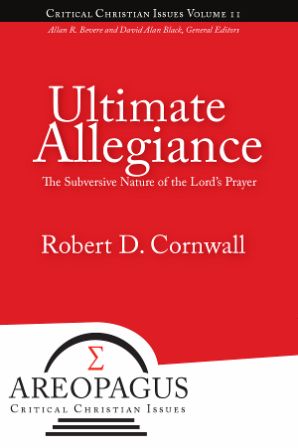
I'm expecting a press release any day. As soon I hear anything I'll let
you know. This book promises to be the Rolls Royce of the series!
(Wink.)
5:10
PM
How funny. I've been perusing the blogs this evening (as I often
do this time of day) and it seems that everyone is trying to force
themselves to say something clever. Some are content to link to other,
more interesting posts. Yes, the blogosphere can be BORING at times. So
can bloggers. I'm not even sure why I blog. By recording my daily
thoughts in autobiographical form, I suppose I'm deceiving myself into
thinking that I am writing reminiscences for the benefit of my
grandchildren -- who, of course, will be far too busy earning a living
and paying off the national debt to care whether grandfather or
grandmother went to a concert at SEBTS. (Someone has said that the
grandchildren of famous authors never read any of their grandparents'
books. I do not doubt that it is true.) Perhaps what I write amuses or
entertains, or even encourages others. I do not know. I surmise my
students get a kick out of seeing their prof in "real life," and what
accidents and incidents befall him. They and others have urged me to
write these lines. But only my wife will be able to read all that is
written between the lines.
But now -- back to
the blogs!
4:50
PM
I snapped this not 5 minutes ago. A patch of sunlight in the dark gloom
of this freezing cold day.

The fact that our downstairs HVAC has gone out makes us doubly glad to
have gas fireplaces in the house!
4:44
PM
We're back from the hospital and Becky is now resting comfortably at
home. The next few days will require great amounts of bed rest. It's so
good to be here with her. I have enjoyed many wonderful things in life,
then have watched them go downstream with all the others. The most
precious gift for which, looking back on my life, I ought to thank God
is surely my wife. I have not the slightest doubt that domestic
happiness is the greatest of all God's good gifts to a man other than
the privilege of knowing and serving Him. The tolerably long row of
books that have my name on their fading dust covers can't begin to
compare with the joys of hearth and home.
Sleep well, Becky
Lynn. Thank you, God, for giving her to me.
8:30
AM
In my opinion, Vernard Eller (d. 2007) was one of the greatest thinkers
of the twentieth century. He is also almost completely unknown today.
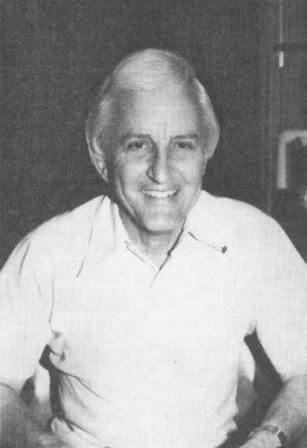
His book Christian Anarchy is a classic work of theology and
should be required reading by seminarians. (If you're unfamiliar with
the term "anarchy" used in its specific religious sense, see my book
Christian Archy for a simplified explanation.)

In a wonderful
little essay Eller addresses the problem of using the term "sacrament"
to describe the Lord's Supper. He writes:
The inevitable imagery
that lies behind sacramentalism is that of the abnormal, the
exceptional, the esoteric, the supermundane breaking into the sphere
of normal life. In the more highly liturgical churches the entire
ecclesiastical staging (altar, vestments, lighting, music, the
works) is designed to foster such a mood; in less liturgical
churches the pastor tries to create the same effect by sliding into
unctuous language and a "reverent" tone of voice. But stage it as
you will, there is no denying that for people to come together to
eat the body and blood of their leader (whether he be man or God, or
both; whether it be done in actuality, in symbol, or in drama) -
this fairly can be described as nothing other than the Great
Abnormality, if not the Greatest Abnormality.
Of course, I agree completely
with this point of view. The human tendency is to sacralize our faith
and transform it into something the Founder of our faith never intended.
I've often smiled at the funereal ambiance in so many of our supper
observances: you have the pall bearers solemnly removing the shroud that
covers the deceased's remains etc. etc. As Eller notes: "The word
'sacrament' ... is a bad one; it says all the wrong things - although
the tragedy is not simply that it's a poor word but that the word all
too accurately describes the current practice of the church."
What word, then, shall we use? Ah,
that's the rest of the essay. You can read it
here. And, for a bibliography of Eller's books, go
here.
7:55
AM
Karl Barth was a great theologian not least because he could laugh at
himself. So writes Daniel Migliore in
this delightful piece (.pdf) over at the Princeton Seminary
Bulletin.
"The point is not only that Barth had
a sense of humor but a theology of humor," notes Migliore.
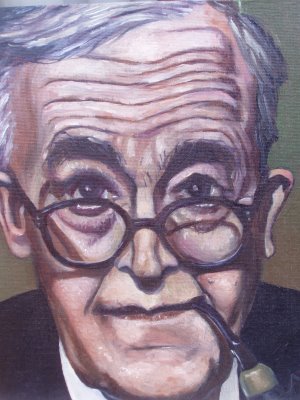
Barth's playful
spirituality reminds me of his son Markus, whose seminars in Basel were
always joyful experiences for me, even if I was the only student who
didn't smoke a pipe. Both father and son lampooned those who wanted to
be known as Barthians. Forgive me for saying so, but I wonder if they
would have said the same thing about all the Piperites and MacArthurites
out there today.
7:37
AM
One of my former doctoral students discusses three essential qualities
of wise leaders. You can read about it
here.
7:33
AM
Oakwood University announces an opening in
Bible.
7:15
AM
Just received an email invitation from
one of my Chinese students
to dine with him and his family on Tuesday night. They're cooking
Chinese dumplings. I accepted of course. Bribes from my Greek students
are always welcome :)
6:54
AM
Later this morning we're off to get B's Adriamycin treatment at UNC.
That will make 5 down and only 1 to go. After that? We'll see....
6:34
AM
Guess what?
There's a new essay at our home page:
Advice to Prospective
Doctoral Students.
6:30
AM
Recently I've been corresponding with some old friends from my Biola
days (1971 and on). And I do mean "old." It's been over 30 years since
we've communicated with each other. Since I don't do Face Book, here are
a few pix from that era for your enjoyment, entertainment, and education.
1) Becky in her
student days.

2) At a banquet
somewhere in Southern California (I don't recall the venue).
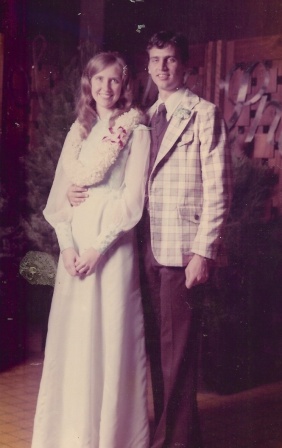
3) Yours truly
performing Hawaiian music with our friend Tom Matsumura. Two island boys doing
their thing (Tom is to the far left).
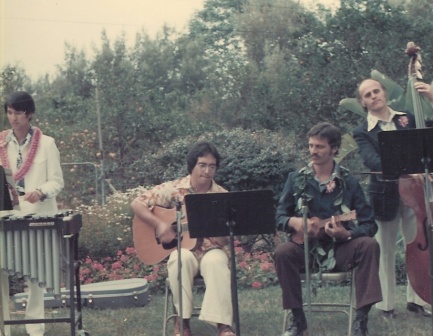
4) Becky studied
nursing. She was planning on becoming a medical missionary to Ethiopia.
Then I came along.
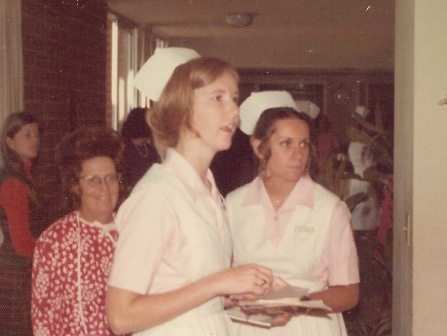
5) I still haven't
popped the question.
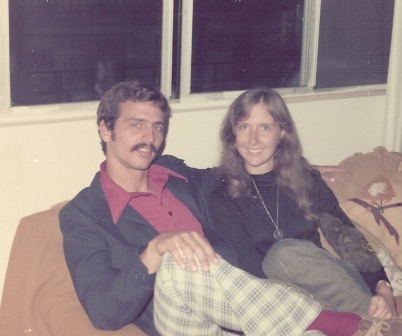
6) Finally married
and enjoying Hawaii together.
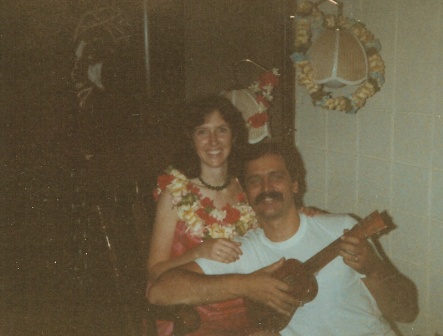
7) My wife
the seamstress. She still sews all of her own dresses.

More to come.
Sunday,
November 28
3:45
PM
One more thought about missions. Our missionaries at Bethel Hill are for
the most part our own church members, like Joel and Kimberly. They are a
real flesh-and-blood part of us. Their children play with your children.
They are real people and are accepted as such. Oh -- it's also
impossible to wear masks when your missionaries come from your home
church. Another reason why we should return missions to the local
church!
3:26
PM
Just got this email:
I picked up and read C. E. Hill's new
book Who Chose the Gospels? Are you familiar with it? The
subject has more to do with who decided on the four gospels and at
the end he suggests that it was the apostle John. But he uses a lot
of the same quotes from the patristics that you do.
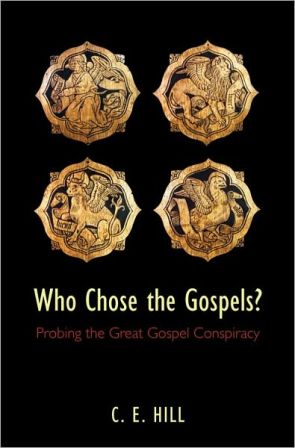
Well, my interest is piqued. Looking
forward to checking it out.
3:20
PM
Another blogger assesses
Why Four Gospels?
3:12
PM
Without a doubt, God has blessed Bethel Hill with some godly and goodly
leaders. This includes brother Joel Bradsher (who also happens to be a
SEBTS student) and his wife Kimberly. Today we had a sendoff for their
family as they leave for a short-term mission trip to Honduras.
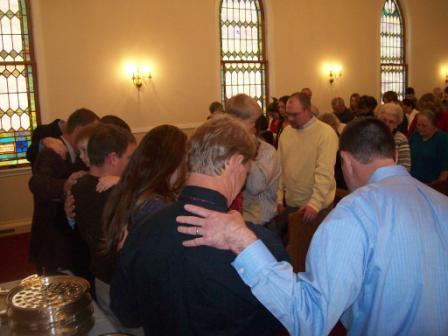
What a wonderful testimony Kimberly gave today. She has found peace in
her heart even though one of her children will not be able to take
malaria meds for health reasons. That's a huge step of faith for a
mother to make (and dad too). Her testimony made me think of trust. I
trust Jesus deeply. I know He cares about me. Even when things go
desperately wrong. I know that Christ has already won the victory over
sin, whether I understand it or not.
So here's the plan folks. Allow God to do something amazing in your
life. So amazing that people shake their heads and exclaim: I can't
believe she would do that! It's so scary over there! Just think what
could happen! When people say that, just smile. And remember: It's
never glib to give the same answer each and every time: If God wants
to, He'll protect us.
Joel and Kimberly,
I want you to know that Becky and I will be in prayer for you
continually as you serve the King of kings in a faraway place. We love
you guys.
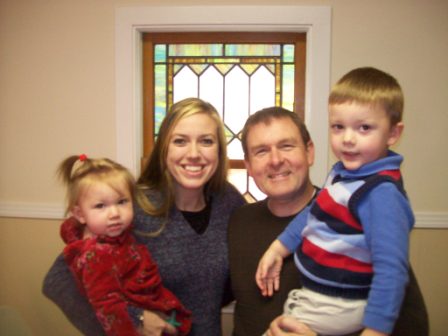
9:05
AM
Sorry, but I couldn't pass up a link to this essay:
Thinking of Christmas?
Update: The needs
in Burji have changed a bit since I wrote this essay. For an update of
current needs, please email me at
dblack@sebts.edu. Thank you.
8:54
AM
Good news! I've finished writing yet another chapter in my book
Godworld: Enter at Your Own Risk. Yesterday I exegeted 1 Thess.
5:12-22.
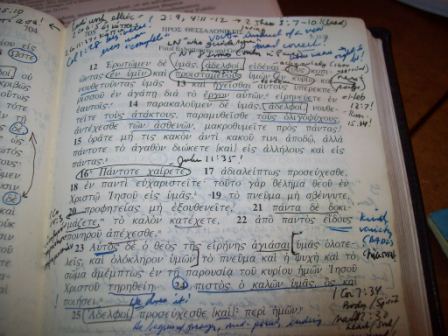
The text goes round and round in my brain and then comes out looking
like this.
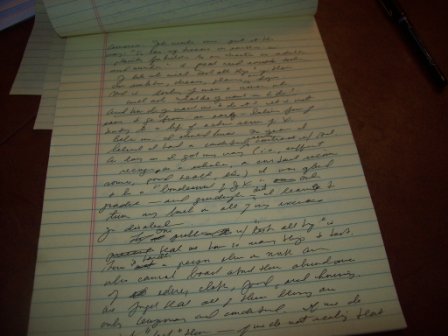
I still have to type it up, but I'm making progress.
8:50
AM
Speaking of Christmas, this is only the second time in many years that
Becky and I have not been in Ethiopia on December 25. It feels so odd.
Last year B was undergoing radiation at this time. This year it's chemo.
Being in Ethiopia has changed my perspective on life in so many ways.
I've gained a broader understanding of poverty, of love, of sacrifice,
of forgiveness, of -- interestingly -- Christmas. In Ethiopia my safe
and secure world quietly crumples up into a little ball. It's hard to
believe in Santa Claus when your friends are being murdered because
they're Christians. In January we would return stateside, bleary-eyed
after all we had seen and experienced. I can become too content with
my American lifestyle, I would think to myself. This world is so
broken I don't have the foggiest idea of where to begin to fix it.
Thankfully, I know Someone who does.
8:38
AM
Quote of the day (Arthur
Sido):
Any exhibition of
personal holiness that is not accompanied by substantive action and
an urgent sense of compassion is not Biblical holiness. It is
nothing more than self-righteousness.
8:27
AM
Today, I am told, marks the first Sunday of Advent. Pardon me, but my
Anabaptism is about to show. I feel strongly that the Christmas holiday
is a distraction, especially for Christians. If you'd like to know why,
I hereby resurrect an essay I wrote on the subject years ago:
Temples of Ceramic Deities
On those
rare occasions when a commentator is flummoxed for a topic to write on,
where does he turn? Inwardly, very often. So please forgive me for
today’s column, which is personal at best and theological only in an
ancillary way.
It was
while worshipping in our wonderful little church in rural Virginia
yesterday that I was suddenly struck with an epiphany of sorts. As our
preacher was winding down an excellent sermon on the real meaning of
Christmas (“it’s not about trees and candles and manger scenes, but
about the Savior”), I was troubled by an odd specter directly in front
of me. It was our communion table. This fairly large-sized table is
normally adorned with offering plates on either side and a large-print
Bible in the middle, opened to a biblical text (which one, I have never
bothered to discover).
Yesterday, however, I noticed that all this had changed. The Bible had
been removed from its position of prominence and shuffled off to one
side of the table, its place of honor having been taken by a now
prominently-positioned manger scene, replete with a ceramic Jesus
surrounded by all the typical trappings—animals, Mary and Joseph, and,
of course, the “three” wise men. On the table was a small Christmas
tree, and the table itself was surrounded by several large poinsettia
plants that straddled the floor of the sanctuary. A much larger
Christmas tree (decorated to the hilt) stood beside the organ, and
Christmas candles throughout the sanctuary completed the ornamentation.
What,
you ask, did I find so disturbing about this scenario? It is open to
criticism from many angles. It fails to grasp the New Testament teaching
on the centrality of Scripture (sola scriptura) and the danger of
human traditions. It fails the test of historical accuracy (the wise
men, of course, were not present at the birth of Jesus but later visited
the “boy” in the “house”). It confuses church tradition with biblical
truth. It misconceives the psychology of Christmas by feeding our
capitalistic urges. But the basic criticism must surely be that it loses
sight of the Second Commandment, which forbids the worship of God in any
way that is unworthy of Him (Exod 20:4-6).
This
law, of course, is not limited to crude pagan statues. It includes the
more subtle, “Christian” (if you will) forms of idolatry as well. It
points to the principle (stated so eloquently by Charles Hodge) that
“idolatry consists not only in the worship of false gods, but in the
worship of the true God by images.” For Christians, this means that
visual or pictorial representations of the Triune God, or any Person of
the Trinity, for the purposes of worship are forbidden. In the words of
J. I. Packer, “statues and pictures of the One whom we worship are not
to be used as an aid to worship.” After all, the Lord God said it quite
plainly: “Thou shalt not make any likeness of any thing.”
The reason is that whatever image we concoct, whatever statue or
figurine we produce, rather than accurately depicting the Object of our
worship, ultimately ends up distorting Him. It inevitable obscures His
glory, or His love, or His power, or some other attribute of His and
thus conceals, rather than reveals, who He really is.
As I see
it, the real difficulty with all of our Christian hubbub at advent
season lies not so much in the fact that the early church had no
interest whatsoever in celebrating our Savior’s birth, or in the fact
that the holiday itself is based on a pagan rite (sun-worship), or in
any of the many other (valid, in my view) objections that can be made
against a Christian celebrating “Christ’s Mass.” It lies rather in the
fact that the cradle of Bethlehem finds it true meaning only in the
cross of Calvary. As James Denny has rightly insisted, “The New
Testament knows nothing of an incarnation which can be defined apart
from its relation to atonement…. Not Bethlehem, but Calvary, is the
focus of the revelation, and any contribution of Christianity which
ignores or denies this distorts Christianity by putting it out of
focus.” What Denny is saying is that the incarnation is simply not the
point. It is its meaning that matters: that the Son of God should
take upon Himself humanity and die the death of a common criminal for
our salvation.
As I sat
riveted to the scene before me, I noticed one last, poignant, thing.
Just below all the glitter of Christmas—just below the manger bed, and
the ceramic Christ-Child, and the animals, and the little Christmas
tree, and the magi—was an inscription written in large letters upon the
front of the communion table. They were the words of our Savior: “This
do ye in remembrance of Me.” The “This”—what, I asked myself, was
Jesus referring to? It certainly wasn’t the observance of Christmas, but
something infinitely more profound. Our Lord Jesus desired for His
people to celebrate, not His birth, but His Supper, eaten
as a full meal foreshadowing the great wedding supper of the Lamb made
possible through the gift of His own body and blood. The Lord’s Supper
was the last meal Jesus shared with His disciples before His
crucifixion. It was the one ceremony that Jesus committed to His
followers for their faithful observance. Thus we read that the early
Christians “devoted themselves … to the fellowship, that is, the
breaking of the bread” (so the Greek of Acts 2:42). These believers ate
the Lord’s Supper weekly, and it was, in fact, the main reason they came
together in the first place (see Acts 20:7; 1 Cor 11:18). It was, as
Steve Atkerson of the New Testament Restoration Foundation likes to put
it, the true “happy hour” of the early church.
I
couldn’t help but notice the irony. Here we spend a month of frenetic
activity in elaborate preparations adorning our humble church sanctuary
in candles and greens, in the lighting of the Advent Candle, in the
reading of the Christmas story, in decorating trees and tables, in
canceling Bible Study so that we can rehearse our Christmas play. Yet
how often does our congregation celebrate the Lord’s Supper, the one
memorial that Jesus Himself commanded us to observe? Once a quarter.
As I
looked upon those lonely, forgotten words, “This do ye in remembrance of
Me,” my heart was grieved beyond measure. I felt like Paul upon entering
Athens, of whom it was said, “His spirit was provoked within him as he
beheld the city full of idols” (Acts 17:16). When I first visited Athens
and saw the workmanship of the architects and sculptors, I admired them
as works of art. But to Paul they were temples and images of pagan
deities. Whatever he may have thought of the art of Athens, the
spectacle of a city dedicated to false worship stirred in him the
conviction that here were people who needed the truth of the gospel. And
I wondered to myself as I walked to my car after the service: Could not
the same be said of us who worship in temples of ceramic deities?
7:49
AM
Last night Becky and I watched
Tora, Tora, Tora. It's the classic flick on the Pearl Harbor attack and far outshines
the sleazy "Pearl Harbor" fiction that appeared a few years ago
in the nation's movie theaters. By
assuming that Japan could not attack Southeast Asia and the U.S. Pacific fleet at
Pearl Harbor at the same time we practically invited attack on "the most
impregnable fortress in the world." Pearl Harbor is a dramatic reminder
that, no matter how well prepared we think we are to face the
unexpected, the unexpected can and often will happen.

An incident not
shown in the movie: On the night of December 6, General Walter Short,
Commander of the Hawaiian Department, along with his wife, left a dinner
party at Schofield Barracks at 10:30. During their short drive home they
passed Pearl Harbor, its lights blazing. Short remarked, "What a target
that would make!" In less than 12 hours his words would come true, and
he and his naval counterpart, Admiral Husband Kimmel, would be found
guilty of dereliction of duty for failing to be on the alert when
disaster struck on "Bloody Sunday."
On the stages of
our own lives disaster often plays out. Why me? Why now? Why again?
Why? Difficulties taunt us with their unpredictability. As Job put
it so long ago: "A person is born for trouble as surely as sparks fly
upward" (Job 5:7). All I can say is this: If God chooses you or me to
bring glory to Him through pain in this world, let's do it well. Let's
bear it joyfully and bear witness through it to others that God can be
trusted.
7:22
AM
When missions becomes an
idol. Great read from the Biola Magazine. For me, life has
had its idols. I have worshipped at false altars. Can missions become
yet another false god? Sadly, it's possible. Ditto for any cause that we
put over Christ -- and this includes doing church "right." God knows
that our self-sufficiency so often turns into pride and idolatry. The
problem is that we don't.
Saturday,
November 27
4:02
PM
Yours truly put his (considerable lack of) culinary skills to work today
and prepared a lunch basket of tuna fish sandwiches before kidnapping
the Luv of his life to a secret rendezvous on the lake.
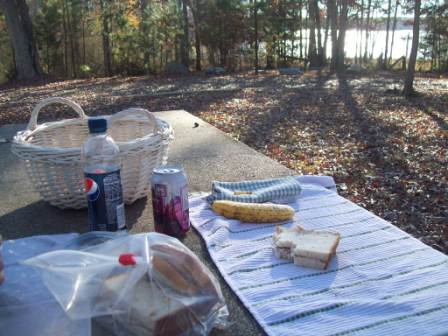
The wind from the lake, which was frigid and totally unexpected, forced
the love birds to finish their lunch in the car.

Ain't
we funny?
1:12
PM
Perfect day for working outdoors.
12:16
PM
A debate seems to be a-brewin' in cyberspace, which I am not even
faintly interested in. However,
this quote
caught my attention:
Here's my contention: there are great
riches to be mined from the original languages; however, if you
cannot teach the meaning of a text without teaching your audience
the original language itself, you aren't much of a
communicator/instructor. I love teaching the languages, but there is
truth in the criticism of some that sometimes academics turn the
languages into a key of gnosis, all because they do not seek to
edify the saints first and foremost.
Now that is certainly speaking the
truth in love. Students of Greek, please take note.
12:05
PM
Just found
this absolutely delicious quote over at The New Republic. It
you are as much a language lover as I am, get ready for a big smile to
break out all over your face.
If you really take in
the awesome variety among the world’s languages – ones with only
three verbs, ones with almost two hundred sounds, ones with only
eight, ones where one word covers what we need a sentence for, ones
where the basic word order is object-verb-subject, ones where there
really are more exceptions than rules, ones with a hundred genders,
and so on – then the idea that there is anything especially
anything about little English becomes as hopeless as
rhapsodizing over the aptness and universality of a squirrel.

11:35
AM
Here are two events we've added to our social calendar for the month of
December:
1) Friday, December
3, 8:00-9:15 pm. Messiah Sing-Along at the Edenton United Methodist
Church in downtown Raleigh.
2) Friday, December
10, 7:00-8:30. The Northeast Piedmont Chorale sings Vivaldi's Gloria
in the Binckley Chapel at SEBTS. Becky and I had the privilege of
singing with this excellent chorale for 3 years before we started
traveling to Ethiopia so often. They will be accompanied by a full
orchestra.
Join us if you can.
11:23
AM
I've been reading
this
article on ancient versions of the New Testament and their
importance for New Testament textual criticism. My interest was
stimulated, in part, by a discussion I had with my father-in-law, who
knows modern Amharic and has studied its ancient counterpart, Ge'ez
(also called Ethiopic). I was amazed at how many Byzantine readings are
found in the Ethiopic, despite its affinities with the Alexandrian text
type. I'm also curious about what the author of this essay calls the
mysterious origins of the Armenian New Testament. The article states:
The link between the
Armenian and the "Cæsarean" text was noticed early in the history of
that type; Streeter commented on it, and even Blake (who thought the
Armenian to be predominantly Byzantine) believed that it derived
from a "Cæsarean" form. The existence of the "Cæsarean" text is now
considered questionable, but there is no doubt that the Armenian
testifies to a text which is far removed from the Byzantine, and
that it contains large numbers of Alexandrian readings as well as
quite a number associated with the "Western" witnesses. The earliest
witnesses generally either omit "Mark 16:9-20" or have some sort of
indication that it is doubtful (the manuscript shown above may
credit it to the presbyter Arist(i)on, though this remark is
possibly from a later hand). "John 7:53-8:11" is also absent from
most early copies.
When I was in Armenia a few years ago I
was surprised (and delighted) to hear that it was American missionaries
who were responsible for translating the Bible into modern Armenian. It
was also interesting to learn that there are two modern dialects of
Armenian in existence today, Ararat-Armenian and
Constantinopolitan-Armenian. If you are at all interested in the art and
science of textual criticism, you will want to become acquainted with
the ancient versions and their significance for resolving textual
variants. The essay I linked to above is an excellent
entrée
into the subject.
Here are a few pix taken during my
visits to Armenia. You never forget your first sight of Mount Ararat in
neighboring Turkey. Spectacular.
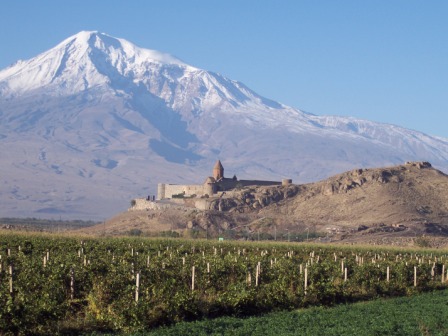
Churches everywhere. Armenia was
Europe's first "Christianized" nation.
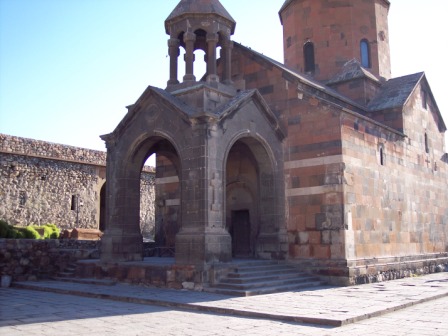
I was privileged to give several talks
while I was in Yerevan. Here I am lecturing on Greek morphology in the
Linguistics Department at Yerevan State University.
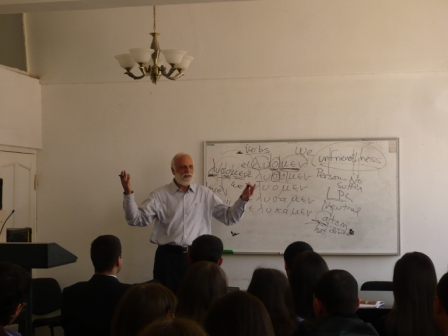
Later I was asked to speak to the
political science students. I was pleasantly surprised at how well
everyone seemed to know English. It was my "American" that gave them
trouble.
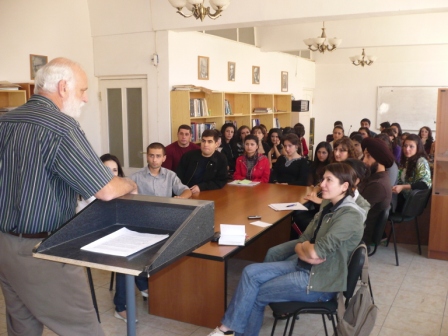
Here's my class at the Baptist
Seminary. We spent a week looking at the book of Philippians.
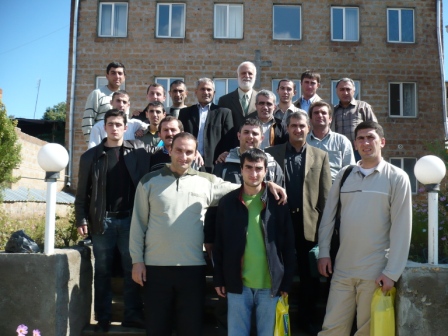
Finally, I was invited to give a
lecture at the Orthodox Seminary just outside of Yerevan. Here are my
attentive students.
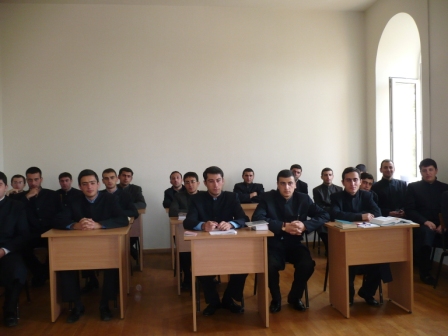
I spoke on the importance of Greek in
teaching and preaching from the New Testament. Here the dean receives a
few gift books for the seminary library.
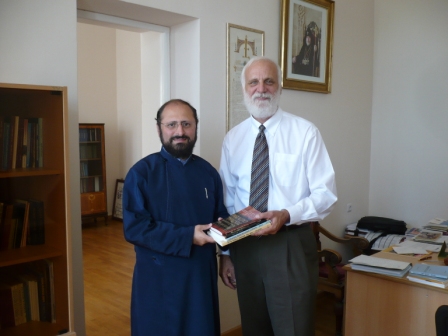
I love traveling. And I loved my visits
to Armenia. I can't wait to get back.
10:30
AM
Here's Jason, one of our elders at Bethel Hill, with his newborn son
Keson. If this isn't a picture of pure contentment. What a duo. A book
and a baby!
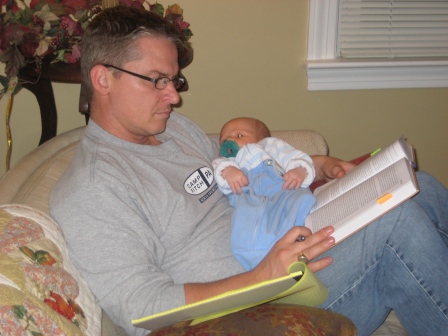
For more beautiful pix, go
here.
10:10
AM
I should have linked to
this quote from David Platt before, but better late than never:
When we pool our resources in our churches, what
are our priorities? Each year in the United States,
we spend more than $10 billion on church buildings.
In America alone, the amount of real estate owned by
institutional churches is worth over $230 billion.
We have money and possessions, and we are building
temples everywhere. Empires, really. Kingdoms. We
call them houses of worship. But at the core, aren’t
they too often outdated models of religion that
wrongfully define worship according to a place and
wastefully consume our time and money when God has
called us to be a people who spend our lives for the
sake of His glory among the needy people outside our
gates?
9:55
AM
One of my favorite bloggers just posted a blog entry about the
Pentecostal scholarship of Gordon Fee. I enjoy reading about my New
Testament colleagues through fresh eyes, and I think Brian writes
extremely well. Check it out
here. I love the reminder that our scholarship is always to be for
the church, and in the power of the Spirit. There's always a tendency to
downplay the role of the Third Person of the Trinity is doing exegesis.
I've been oh-so guilty of that myself. I shake my head just thinking
about it.
Update: Henry
Neufeld joins the discussion
here.
9:43
AM
I direct your attention to a
post-SBL essay on the wonderful books that were available at a
discount during the conference. It's a good reminder of the importance
of reading in our book-wary generation. It also shows me how much
reading boils down to a matter of taste and possibly need. I have
absolutely no interest in reading about half the books listed here, but
that's just me.
Friday,
November 26
7:44
PM
It was a fine afternoon, though a bit gloomy outdoors.
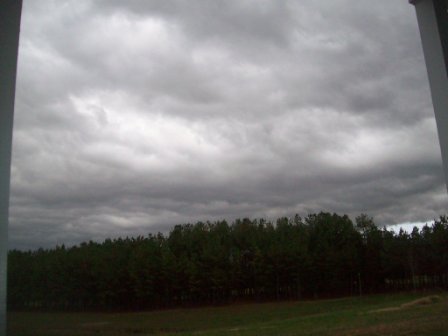
The storm clouds did not dampen our spirits one iota, however. Here the
patriarch of the family waxes elephant about various and sundry.
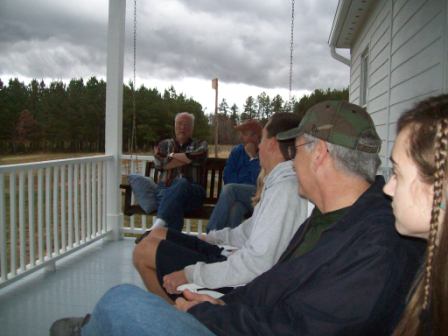
When the dinner bell was rung, this is what greeted us in the dining
room.
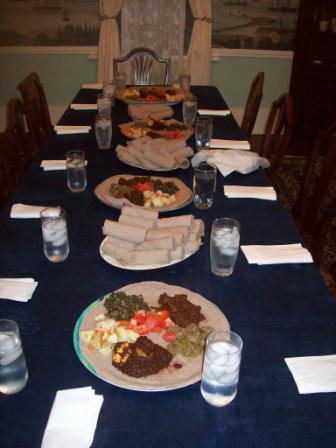
I have rarely seen a more beautiful spread of food. Becky and I were
deeply honored and graced by everyone who sat around our table this
evening. Our thanks to each one for coming.
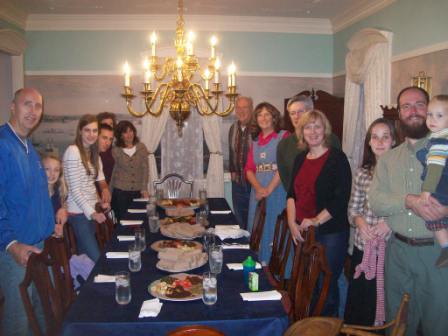
The art of eating Ethiopian food is only acquired after long years of
experience. Here dad shows us the way.
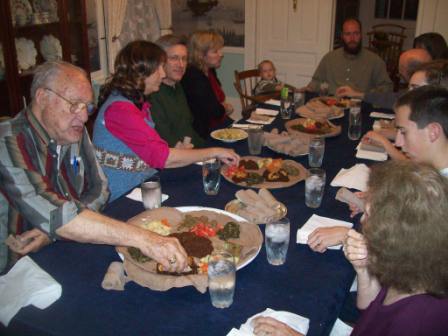
Before dessert was served Becky gave her testimony of God's faithfulness
to her (and us) through the past several years of seemingly endless
trials. Life is fragile, she told us. But God's character can
always be counted upon. It was truly a wonderful time of celebrating
the Lord we love and so feebly serve.
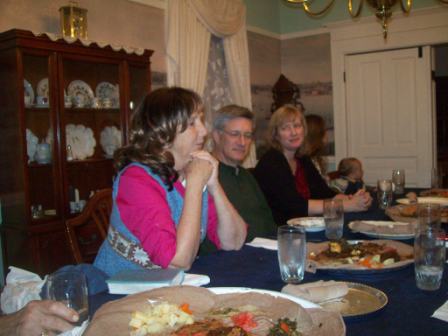
The hall now sits empty again, except for Becky and me. All is peace and
quiet. Truth be told -- a bit too quiet. We can't wait for Liz, Matt,
and the boys to return.
Life is fragile.
Boy is that the truth. Thank God for VEPs -- Very Encouraging Persons.
My desire to pursue higher levels of commitment to Christ increases
because of them. The further we are along the passage of time the more
we need others to make a positive contribution to our passion to follow
hard after Christ. Tonight I feel like I have been greatly encouraged
along those lines. The desire to finish the course remains strong,
perhaps as strong as ever. Praise be to God.
3:57
PM
If you're planning on taking my exegesis of Mark class next semester,
here's a website
you'll want to bookmark.
2:08
PM
Have you ever witnessed a miracle? I have.
The story begins a few years ago when
Tesfai's 8-year old daughter is beheaded in central Ethiopia. The
enemies of the Gospel in their little village sought to force Tesfai and
his wife, who claimed to be followers of Jesus, to leave and settle
elsewhere. Then tragedy followed tragedy. Because of the severe
persecution Tesfai's wife turned her back on her Christian faith and
returned to her former religion. She married a man from this faith, who
promptly began beating her. She had had enough and finally divorced him
too. All this time Becky and I had been fervently praying that Tesfai
and his wife would somehow be reconciled. At long last she was ready to
repent and return to Christ -- and her husband. But Tesfai was not ready
for that. How can I forgive her after all she's done to me and my
children? On my last trip to Ethiopia I met with brother Tesfai just
to love on him and pray with him. I can't imagine what you're going
through, I thought to myself. I then asked him if he would be
willing to read the book of Hosea and meet with me a week later. He did
-- and at this point in the story I pour the situation into my mental
receptacles but so much runs over that I just can't account for it apart
from a miracle. Everything worked out just as we had been hoping for and
praying! Tesfai forgave his wife, took her back home, and the mother
church held a church-wide ceremony celebrating their restored
relationship. Today Tesfai and his wife live in a different village and
manage their small roadside shop along with their surviving children.
Their testimony for Christ is strong, and many of the enemies of the
cross can only shake their heads in wonder at the power of the Gospel.
I thought, O
what a foretaste of glory divine! This story is but one small
fragment of the glory that will be revealed when Christ returns. This
age is a wreck but as many as received Him to them He gave the authority
to become children of God. The whole creation, meanwhile, waits on
tiptoes for the day when the children of God will be revealed.
Have you ever heard
of such a miracle? Perhaps your own marriage is one. The lesson is
plain: There is NO hurt that is so big that God cannot heal it!
1:45
PM
Can't wait to get back to campus next week. My colleagues will be coming
down off their post-ETS/SBL highs, excited and passionate about what
they're learning, and my students will (hopefully) return from their
holiday travels safe and refreshed. What ought to be the goals of our
instruction? Love God and love others. Simply that. The Macedonians gave
themselves first to the Lord and then to others. Too often a good term
paper or doctoral dissertation is a substitute for the gift of
ourselves. Only Christ can satisfy, and when He does, everything else
falls into place -- including our studies. The church always multiplies
when the Word is not only taught but lived in the power of the Holy
Spirit.
1:36
PM
Becky just cooked up the best chicken fettuccini. I wanted seconds but
decided I'd save my appetite for injera and wat tonight. Then I'll pig
out.

12:24
PM
Guess what I'm reading (online) this weekend? The classic book by James
Alexander Haldane:
A View of the Social Worship and Ordinances of the First Christians,
Drawn from the Scriptures Alone. It was through Haldane and his
pupil Greville Ewing that Alexander Campbell entered the fold of the
restorationist movement. If you are at all interested in church renewal,
this is a must read.
11:56
AM
Quote of the day (from a fellow Basler, John Howard Yoder):
Pentecostalism is in our century
the closest parallel to what Anabaptism was in the sixteenth;
expanding so vigorously that it bursts the bonds of its own thinking
about church order, living from the multiple gifts of the spirit
[sic] in the total church while holding leaders in great respect,
unembarrassed by the language of the layman and aesthetic tastes of
the poor, mobile, zealously single-minded.
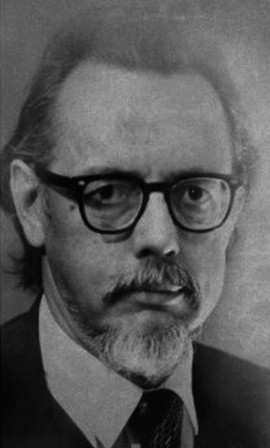
From Concern: A
Pamphlet Series for Questions of Christian Renewal (p. 78).
10:16
AM
From
Why Four Gospels?
If, then, the evidence favoring Markan priority
were now to be seen as no longer compelling, there is reason to question
whether the rejection of ancient Christian tradition about the origins
of the Gospels may have been premature. And, in fact, during the past
thirty years the hypothesis of Markan priority has been subjected to
such a devastating scrutiny that it is no longer possible to use it as a
sure basis for exegesis (1). And if its basis is no longer certain, then
it can no longer be used as an argument for the rejection of the
historical evidence.
9:43
AM
Strayer University (Online Department) announces an opening in
Religion. (Is
online, telecommunicating teaching the wave of the future?)
9:12
AM
This morning I am writing a long recommendation letter
for a teaching position
for one of my current Ph.D students. I am doing this often these days.
Even though they are ABD I am encouraging them to apply for fulltime
teaching jobs, since on the job training is still the best kind of all.
I began teaching Greek at Biola when I was still an M.Div. student.
Let's never underestimate the potential of our scholars-in-the-making.
9:08
AM
Just got an email from a close friend. He wrote:
I just wanted to take a moment to
encourage a friend.
This
man has been to me a partner in the ministry, an intercessor, a rebuker,
a counselor, an affirmer. Becky and I have enjoyed a large of number of
these kinds of people in our work and ministry. You can spot them a mile
away. They are always asking you about the issues you're facing or the
trips you're about to make or the problems you're trying to solve. I am
so thankful for special friends who play a special role on our team.
Now
the question is: Do I fill this role in the lives of others?
8:45
AM
Commenting on spiritual gifts, Alan Knox
concludes that
...when the church
gathers, it should not be a one man – or even a two man – show. In
fact, every believer should expect to speak to or serve brothers and
sisters whenever they get together with them. Multiple people
speaking or serving one at a time is not disorder – in fact, this is
Paul’s very definition of order. We miss what God wants to say to us
and what God wants to do among us when we do not allow everyone to
speak and serve as God directs.
Will it be messy?
Probably. But,
people are messy, and we are fooling ourselves if we think our
highly planned and efficient meetings keep people from being messy.
If anything, our meetings hide the messiness, or sweep it under the
rug, instead of actually dealing with people and their lives and
their messes.
Please read that last sentence again.
It seems that God's idea of a "worship service" is utterly different
from ours. How many times have I been in a church meeting that "went
wrong." That's because we planned the service ahead of time and decided
in advance just what kind of meeting it was going to be, what would be
done, and what results we wanted. When it didn't work out exactly the
way we planned, we were disappointed.
God has handed down His plans for the
meeting of the church. Perhaps it is high time we reported to
Headquarters for His pattern.
A final thought: I am seeing more and
more Madison Avenue approaches to church advertising by which we "sell"
our programs and push our "ministries" (our wares) to attract the
attention and money of people away from other equally pushy churches.
The hype and competition seem almost normal today in some denominations.
8:22
AM
Going
shopping on this Black Friday? Nothing wrong with saving some money. But
Mammon is still a god, as Eric Carpenter reminds us (On
Mall Worship):
Many people who claim
Christ as Lord never stop to even question "Black Friday." They
never step back to ask whether or not we should be involved is this
materialistic, gluttonous worship-fest. On a bigger level, they
don't seem to ask larger questions about how we spend the money over
which God has made us stewards. Simply put, on this issue at least
they act just like unbelievers.
God has made America one of the
wealthiest nations on earth, and most of us think this is our divine
right, as if we had no obligation to a lost world. Could it be that our
materialism is keeping the world in darkness?
7:38
AM
One of the reasons I love the farm so much? It allows for quiet
conversations in a peaceful atmosphere. Right now Becky and Mrs. Lapsley
are having some mother-daughter time on our front porch, sipping coffee
together and sharing their hearts and lives. In the tidal wave of life's
events and experiences, the porch is a safe place.
A takeaway? If
we are to gain spiritual passion from our friends, we must spend time
with them.
Dave
Thursday,
November 25
6:52
PM
Just back from the Lapsleys in Cary. Had gobs of fun and plenty of
turkey and ham to eat. I've got lots of family pix. But those are for
tomorrow. Tonight I wanted to show you this 1824 KJV Bible that Becky
presented to her brother Ben today.
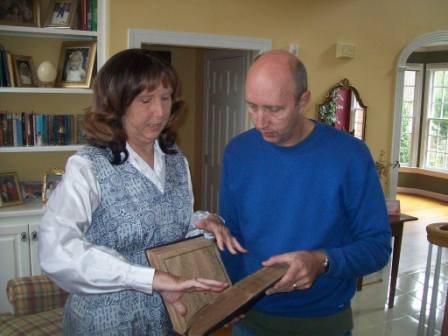
It has been in the Lapsley family for generations. The names in it go
back to the early 1700s. Somehow we ended up with it when Becky was
given all of the genealogical records her dad had been keeping. We
thought it was high time that the eldest (and only) son in the Lapsley
clan received the family Bible. What a great heritage!
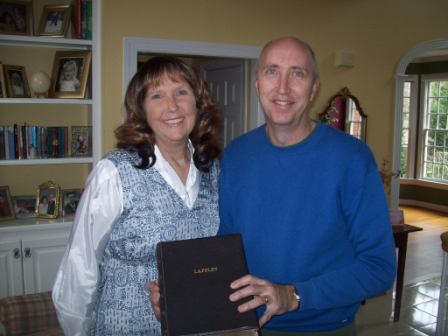
Mom and dad are now with us at Bradford Hall. They'll spend tonight and
return to Cary tomorrow. The hall, of course, is named after Becky's dad
(Bradford Lapsley) as well as one of her direct ancestors, Captain
William Bradford (of Mayflower fame). The rest of the clan will come to
the farm tomorrow for an Ethiopian feast.
Hope you're having
an enjoyable and Christ-centered Thanksgiving Day wherever you are. The
secret of the abundant Christian life is Christ and Christ alone. May He
have the preeminence in our families this day and every day.
9:21
AM
Read: I am Thankful -- for
Troubles?
8:08
AM
I was greatly blessed and challenged last night while listening to a sermon on
fatherhood by Mark Stevens of Happy Valley Church of Christ (see 5-9-10, "Fathers
Submit!"). "When you become a father, your heart
permanently resides on the outside of your body for life," said
Mark, and he is right. When God touched my family with a renewed burden
and vision for missions, it was partly through the example set for us by
Becky's father. Here's a man with a huge "father's heart" for the people
of Ethiopia, so much so that many years after leaving the country he
still serves the people of that great nation through his online ministry
(Good Amharic Books). I
think this idea of "vision-shaping," of getting our children to look
beyond themselves and their own families to a lost world, is a hugely
important part of parenting. There is something for everyone to
do. This is true of your family and of mine. We can all become
world Christians. May God grant each one of us a heart today, not only
of thanksgiving, but also of thanks giving -- giving our
all for the Greatest Cause on this earth, sharing the love of Jesus with
the nations.
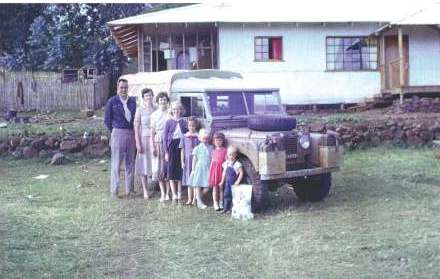
Wednesday,
November 24
3:06
PM
Praise the Lord! Becky had her bloodwork done again this morning and we
just got the results via fax. Her white cell count is now 3.9 and her
platelets stand at 171. This is wonderful news. So much to be thankful
for this week of Thanksgiving.
2:48
PM
I just posted the Spanish translation of my most recent essay:
Los Diez
Mejores Libros para el Estudio del Griego Nuevo Testamento.
My thanks to Lesly and Thomas Hudgins
for their labor of love in translating this piece for me. (See
their website for more.)
2:20
PM
A long overdue update on our sister Ayelech. As you know, we sent her,
via our clinic "ambulance" (a rickety old Land Cruiser), all the way
from Burji to the hospital in Soddu for a check up. However, nothing
could be done for her until she has a double mammogram, so she returned
home. Some time this week or next Becky and I hope to send Ayelech to
the capital where mammography is available. We are praying that the
results are benign. It is next to impossible to treat cancer in
Ethiopia; chemo and radiation are simply not widely available. This
seems like an incredible statement to make, but it's true. It makes you
feel so small, so useless when faced with a medical system that is
broken (but really, really trying). This is the real world of missions
-- learning to make do with what you have and getting to know God so
much better in the process. Please pray for Ayelech. It breaks my heart
to think that her tumor might be cancerous. I'm coming to realize again
and again that this is the rhythm of our mission work in Ethiopia: hope,
despair, then hope again. One can never stop hoping.
P.S. Speaking of
cancer (and hope), I just learned that my dear colleague Rod Decker of
Baptist Bible College and Seminary is now facing
his own battle with cancer.
Rod, you are in the prayers and thoughts of all of us.
9:48
AM
The latest essay on our home page is called
Ten Best Books for
Studying New Testament Greek.
Tuesday,
November 23
6:52
PM
Potpourri:
-
Becky's mom
and dad have arrived in Raleigh. Hooray! We'll have Thanksgiving
dinner with them, Lord willing, on Thursday.
-
Our meeting with the radiologist
today went splendidly well. God has blessed us with such excellent
health care at UNC. All of the staff in the radiology department
were so excited to see Becky again. The feeling was mutual.
-
Was delighted to see
this huge victory for the U.S. Constitution.
-
Grateful for
this review.
-
Am writing an essay on my
favorite books on New Testament Greek. Hope to post it tomorrow.
10:36
AM
Brian Fulthorp's latest (on
2 Corinthians) is a real doozy:
It is through strong
effective leaders God mediates his gospel power! People of good
standing and strong character, well dressed and well spoken, well
organized and without any flaws, well educated and on and on! No
weakness allowed, no flaws, no poor speech or speaking skills, none
of that right? And probably too, many of us would not last long in
a congregation lead by weak leadership would we? or leadership that
was perceived as weak…
Too bad Brian has never been to
post-graduate school. We'll have to work harder on hiding the truth:
that many of us in Christian leadership are driven by the same petty
ambitions as everyone else in America -- ambition, pleasure, and
recognition.
9:55
AM
Why the Gospel of Luke?
Through hindsight we
can determine the assignment that Luke received from Paul by
comparing the Gospels of Luke and Matthew and by noting Luke’s
deviations. In the first place, Luke carefully followed the main
structure of Matthew throughout and generally adhered to the order
of its various sections and anecdotes, though he also made highly
interesting changes. For example, his story of the birth of Jesus is
totally different from Matthew’s, which (as we have noted) was
almost entirely apologetic in tone and content. Luke, however,
provided a straightforward narrative that stems either directly or
indirectly from Mary herself. When Luke came to Jesus’ Galilean
ministry he added certain details to each of the stories from
Matthew’s Gospel that he decided to adopt. Indeed, in one way or
another he absorbed nearly everything that Matthew had written, and
yet managed to add a good deal of extra material. Luke did this by
omitting a number of duplicate stories (e.g., the famous Lukan
omission of Matt. 14:22–16:12) and by inserting into the heart of
the Matthean text at the end of the Galilean ministry (cf. Matt.
19:1–2) a section of no less than nine long chapters, Luke’s central
section (9:51–18:14), comprising (1) the excerpts that he had
extracted from Matthew’s five great discourses in order to lighten
the content of his own version of them and (2) additional sayings
and parables that Luke had collected. (It is perhaps worth noting
here that Luke’s central section roughly corresponds to the
conjectural document known as Q, which many modern scholars consider
to be one of the sources of Matthew and Luke.)
From
Why Four Gospels?
9:33
AM
I love porches. Becky and I sat alone (the Rondeaus are visiting
friends) both last evening and this morning on our front porch. Last
night we enjoyed the relatively warm air and the bright full moon, so
full that we could see the contrails of invisible jets flying 30,000
feet overheard. This morning we ate breakfast together on the front
porch, yours truly having fried up some eggs and potatoes, along with
farm fresh toast and homemade jam. As we sat there and talked about
life, the thought went through my mind that joy -- genuine joy! -- is
never optional for the believer in Jesus. This includes joy in times of
testing and even despair. I recall once hearing one of my pastors in
Hawaii telling his "preacher boys" (there were about 5 of us whom he was
mentoring), "All of you will face times of despair in life. If you never
face despair, you are not a genuine Christian. Being a Christian means
being like Christ. It means facing life as He faced it. You must enjoy
things in life just as He enjoyed the good things of life. You must be
as happy as He was when He attended the wedding at Cana. But you must
also know what it means to be in the Garden of Gethsemane, when your
friends have forsaken you, when you feel that God Himself has forsaken
you. Life will go on. Just remember Easter Sunday. So if you are a
genuine Christian, you will know peace and joy and happiness. And you
will know despair and sorrow and testing. Accept both as from the hand
of the God whom you love and trust."
That counsel has
remained with me all through the years. This is the message of
Christianity, and B and I are going to tell it to anyone who will listen
to us, here or in Africa.
God loves
you, each of you, with all your hurts and your fears, joys and
sorrows. He wants to throw His arms around you and let His love
break through your pain. He is a great Savior and Lord and a
wonderful Friend.
This is the same
message I had to preach to myself this morning. "Rejoice in the Lord
always. He is still at work. He is at work weaning you from this world
to the next."
So, yes, I love my
porches. Still, it is hard to explain how some days this farm can feel
so much like home, and some days it seems the farthest thing from Home.
Monday,
November 22
6:34
PM
Bob Hayton
reviews
Which None Can Shut: Remarkable True Stories of God’s
Miraculous Work in the Muslim World.
I liked this statement of Bob's:
I couldn’t put this
book down. And when I did, I was moved to pray more intently for the
continued advance of the Gospel in Muslim lands. I fear that many
Christians in America are more focused on the encroaches of Sharia
law and Muslim suicide bombings than they are on the need these
people have for Jesus Christ and the Gospel of God’s grace. May this
book serve to elicit prayer rather than prejudice from God’s people.
Prayer
rather than prejudice. No one could say it better.
6:16
PM
This week my beginning Greek students are writing their second take-home
exam of the semester. I look upon Greek as a garden in which there are
many pleasant groves. I have tried to "humanize" Greek grammar and have
vowed to make the subject no more difficulty than it has to be. I feel
ashamed to admit that I lasted only 3 weeks in my beginning Greek class
at Biola before dropping. As the Romans said, initium dimidium facti
-- the beginning is half the deed. But it is only half. When we complete
chapter 13 at the end of the semester we will have covered exactly one
half of our textbook. If students fail to reach the finish line, I will
be partly to blame.
Do well, O ye my
students! I'm praying for you.
1:55
PM
Just bought tickets for Becky and Lizzy to attend the
Nutcracker
at the Carolina Ballet.
B and I saw this performance several
years ago and it is a dazzler.
1:15
PM
Here's another reason
why I dislike PowerPoint and almost never use it in teaching. A key
quote:
The presentations that
work are not the ones with the most data or the most elaborate
charts and graphs; the winners are those with the most compelling
and convincing narratives.
Amen!

12:05
PM
Allan Bevere, my co-editor of the
Areopagus Series,
shares his heart about
attending this year's SBL meeting.
10:12
AM
On the original motivation for Matthew:
As soon as the first
wave of converts had been baptized and their instruction organized
by the Twelve, the apostles’ thoughts turned to the practical
question of how to unify and consolidate their teaching about Jesus.
The apostles realized that they somehow needed to promulgate those
passages of the Holy Scriptures from “Moses and all the prophets”
(Luke 24:27) that Jesus had explained to Cleopas on the road to
Emmaus. It also became clear to them that their main apologetic task
was to demonstrate to the Jewish authorities that Jesus had
literally fulfilled all the prophecies about the Messiah. These
considerations were the original motivation for the composition of
the Gospel of Matthew.
From
Why Four Gospels?
9:58
AM
Derek Leman raises an interesting question about
the mountain in the Sermon on the Mount. Of course, if you've ever
been to the Holy Land you've stood atop the famous "Mount of the
Beatitudes." But could the Greek imply something quite different from
the traditional conception of a certain mountain? Could the
article be used here, say, as the equivalent of the English idiom "I'm
going to the beach today" or "I'm going to the mountains this weekend"?
In neither of these cases do we have a particular location in mind. The
article is used generically. Perhaps all that is meant here is "He went
up on a hillside and began teaching them...." The Greek, I think,
permits such a rendering.
What do you think?
9:35
AM
Openings:
8:34
AM
The other day I ran across something Greg Laurie wrote in his book
Every Day with Jesus (p. 259):
Ephesians 5:18 says, "Do not be
drunk with wine, in which is dissipation; but be filled with the
Spirit." The original Greek text makes it clear this applies to all
believers: to men as well as women, to the young as well as the old.
Everyone needs to be filled with the Spirit.
If there is
something in the Greek text that indicates this, I must be blind to it.
I guess it's no problem for pastors to refer to the "original Greek"
when the Greek has absolutely nothing to do with the point they're
trying to make. A hundred books on Greek, some written by me, cannot
preclude eisegesis. Obviously, at this point I have no intention of
revising the advice I give to all my Greek students: Do not use Greek
from the pulpit. However, the cynic or skeptic in me tells me it's
all for naught.
Meanwhile, since no
one has invented a literary contraceptive (and authors are always
pregnant), it's back to writing.
8:21
AM
We're preparing for a busy week. Tuesday we have an appointment with
Becky's radiologist at UNC, then on Thursday we're eating Thanksgiving
Dinner at her brother's home in Cary, NC. This will be a mini-family
reunion of sorts. Her brother Ben will be there, as well as her sister
Barbara along with their spouses. Mom and Dad Lapsley will be flying in
from Dallas to complete the dinner party. It feels like a lifetime since
we've been together in one place. My cup overflows just thinking about
it. If you remember, the Lapsleys were missionaries to Ethiopia from
1954-1964. I thought of them when I was having my devotions this morning
from Mark 10:29: "Anyone who leaves home or brother or sister or mother
or father or child or field for me and for the Gospel will receive much
more in the present world -- a hundred times more houses, brothers,
sisters, mothers, children, and fields, and persecutions as well." That
has certainly been the case with mom and dad, and I thank God for them.
On Wednesday we'll get Becky's blood drawn in anticipation of next
Monday's chemo treatment, and then on Friday everyone will come here to
the farm for Ethiopian fare.
Amor est vitae essentia!
Sunday,
November 21
5:48
PM
I am really liking writing the final chapter to Paul, Apostle of
Weakness. It reminds me so much of our happy student days in Basel
so long ago, when I first worked on this book. As I proceeded in my
research and writing my interest in Pauline theology grew and grew. I,
who had not the slightest preparation -- in heritage, schooling, or
character -- for understanding biblical theology, which I thought was
the boring purview of esoterics -- I discovered a thousand bright facets
on those jewels of Pauline thought. I, the absolute neophyte, found
undiscovered gems in that pile of stones, and gradually my antipathy
toward biblical theology ebbed away until now I mentor doctoral students
in the subject. Yes, we enjoyed those exuberant days of living in
Europe.
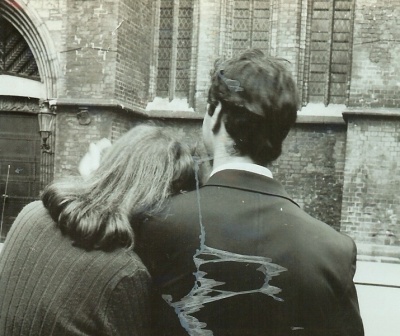
I began to love Paul for his sense of beauty as much as for his ideas,
and so it remains today. I cannot approach his epistles without being
drawn in by the countless rhetorical flourishes I find in them --
epistles that are sealed and beribboned with love and painstaking labor.
I readily admit that I am a glutton -- for I have tasted deeply of Paul
and yet crave more and more of the delicious morsels of truth he tosses
to the dogs under the table. He says so beautifully the thoughts I'm
often thinking. His letters are pieces of technical brilliance
transformed into pure delight. What a man -- this apostle who takes
criticism in good spirits and carries to excess his praise of others --
this servant of God who said, "My one and only ambition in life has
always been to proclaim the Good News in places where Christ has not
been heard of, so as not to build on the foundation laid by someone
else" -- what a man, this missionary of missionaries and theologian of
theologians!
Oh God, please
make me like Paul!
4:02
PM
We had a great time at Bethel Hill this morning. What a zany, crazy,
wonderful family we have. Chris Jacobs, who is teaching through the book
of Nehemiah in our Sunday School class, reminded me of the importance of
prayer whenever we face spiritual warfare. (More on that in a moment.)
Then pastor Jason showed off his newborn son during the church-wide
gathering at 11:00 am. Tiny babies are very precious and Kasen is way
too cute for his own good. He slept until the very end of the service
when, in no uncertain terms, he cried out, "That's it, Daddy. You've
talked long enough." I enjoy listening to my pastor teach. Today he was
in Acts 19. I jotted down gobs of notes, but here are two interest
things that struck me from that text.
1) In Acts 19:4,
Christians are referred as people of "the Way." The term refers to the
Christian movement. Luke, I notice, uses it often in Acts (9:2;
18:25-26; 19:23; 22:4; 24:14, 22). Jason's point was to call out those
who practice "easy-believism," and there are many of us who are guilty
of this in Baptist circles. Genuine saving faith always involves a
change in our lifestyles. That's why I don't like to call it
"Christianity" as much as "Christianality" -- a term I define
in this
essay. No, I am not denying the forensic, juridical, or judicial
side of justification. On the contrary. I am elevating that doctrine to
its proper place when I insist, as do the Scriptures, that good works
are the necessary fruit of our salvation.
2) I had to smile
when I read, again, about the famous "school house of Tyrannus" (Acts
19:9). I say "smile" first of all because of the teacher's name (in
English we'd say "Tyrant" -- what a great name for a school teacher!)
and second because the Greek term for "school house" has been hotly
debated. Louw and Nida (in their Greek-English lexicon) say "it's better
to use a translation such as 'lecture hall' rather than 'school,' since
one does not wish to give the impression of the typical classroom
situation characteristic of present-day schools." So there you have it
-- Paul was a "lecturer"! I doubt it. Especially when you consider the
term Luke uses to describe what Paul did daily for two years in Ephesus,
dialegomai, which implies more of a dialogical approach to
teaching rather than hours of lecturing.
So much to reflect
on....
Afterwards I took
Becky to one of her favorite restaurants in South Boston for lunch then
it was home again home again.
But back to prayer
for a minute. I am amazed at how difficult it is for me to be honest
with God sometimes. Especially in the quiet moments when there is pain
and when I think I am facing a "hopeless" situation. I still have not
learned the discipline of thankful prayer (Phil. 4:6). Intimacy
with Jesus is something I seek but so rarely find. My world offers me
too many cheap substitutes. But no intimacy, no passion. Without first
listening, speaking becomes rote and mundane. Thank God I have special
friends in my life who know my weaknesses and who nudge me forward. This
includes a very special Priscilla and Aquila (you know who you are) as
well as a Philemon ("I have derived much joy and comfort from your
love," Philem. 1:7) and an Onesiphorus ("for he often refreshed me," 2
Tim. 1:16). I especially like this passage in Acts 28:15: "When the
brothers and sisters there heard about us, they came ... to meet us. On
seeing them, Paul thanked God and took courage." God encouraged
Paul through a cadre of fellow believers -- much like the special
encouragement I feel every time I meet with the brethren at The Hill.
Paul's friends were a resource upon which he obviously depended.
Sometimes my encouragers are dead people. I find the biographies of
Spirit-filled Christians to be rich in counsel and guidance. I recall
being impressed at how James Fraser, missionary to China, would often
weep while praying. (See his biography,
Behind the Ranges.) Most of us are taught that being a "man" means
not crying, not admitting your heart is breaking, not acknowledging it
when you hurt. We learn a lie -- that hurts should never be admitted,
that weeping is a sign of weakness. Of course, my greatest Encourager of
all is the Man of Sorrows Himself, who has a most sympathetic ear.
Occasionally I just need to bare my soul to Him, sometimes (like
yesterday) through my tears. It's okay, He tells me. I
understand you perfectly.
And that is enough.
8:22
AM
Blogging
quote of the day:
... blogging helps to
put a personal face on biblical scholarship by allowing scholars to
speak with an informal public voice different from the voice of
academic publication. Even the most academic of academic blogs is a
much more personal expression of the author's thoughts than any
academic peer-review publication.
Yes, yes, yes! Personalize your
scholarship, folks! Including your feet of clay lol!
8:05
AM
I have often asked myself this question:
What is a disciple of Jesus? I think you'll agree with Geoff's
answer. Simple and very much to the point!
7:52
AM
If you're an SBL-tracker, you've got to read Ken Schenck's
pass-in-review of the latest sessions:
SBL
Day One (2010). My favorite snippets:
Wow, look at all these books!
Most of these books are pointless.
Not another commentary series!
Popular doesn't correlate to truth at all -- it might even work the
other way around.
The budding scholars are grasping at straws to present something
worthwhile so that they can get a job. Half or more are about to face a
rude awakening: Everyone is glad to take your money and to give you a
degree. No one is waiting to give you a job.
Truth for its own sake is perfectly legitimate, but in most seminary
and college settings should only take up a small percentage of learning
time. At SBL, the vast majority of stuff falls in the category of
"truth for its own sake."
All I can say is: Amen and Ouch!
7:38
AM
Good morning, bloggers and bloggerettes!
The sixteenth century
Pilgram Marpeck
was a layperson's theologian. He took complicated doctrines and
explained them in a simple manner. One of his most important
contributions to the Anabaptist movement in southern Germany was his
approach to the distinctions between the Old and New Testaments.
Although he held all of Scripture to be equally the Word of God, he made
a distinction between the purpose of the Old Testament and the purpose
of the New. In Marpeck's eye, the fundamental error of the Magisterial
Reformers was their willingness to make the Old Testament normative for
the church.
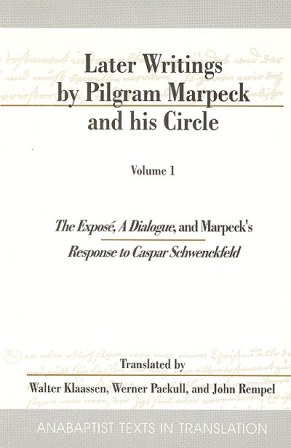
It seems that a
modern day Marpeck is calling us to beware of taking Old Testament
practices and assuming they are normative for the modern church (read
Back to the Old Testament?). In fact, for him theology is nothing
more than the exegesis of the Scriptures. I think this is good news for
the Body of Christ. May all of our theology be steeped in the Bible
rather than in our manmade traditions, and may we become ever more vocal
and vigorous in submitting our own lives and practices to its clear
teachings.
Peace,
Saturday,
November 20
7:04
PM
After the news of the new
pat down regulations at TSA, will anyone enjoy flying again? Only a
heartless egoist would fail to sympathize with those subjected to the
now infamous "freedom frisk." I dislike flying immensely. Far from
resembling the graceful flight of a bird, you are cramped into an
uncomfortable box with narrow seats and viewless windows. Sailing is
much more enjoyable, as is train travel. I adore trains. To travel by
train is to see the world, to see life as it is lived out in towns and
valleys and cities and mountain passes. My favorite train rides were
from Cochin to Mumbai, Pusan to Seoul, and Bucharest to Budapest (my
compartment is shown here).

I find myself not having the slightest hesitation to insist upon human
dignity when facing a TSA employee. On a train, you're left alone.
6:41
PM
Caleb has done it again. After a delicious supper of liver and onions,
he decided to bake cinnamon rolls.

Eatin' is some serious business 'round here!

1:56
PM
Odds and ends:
1) Thinking in
Christ has published a
positive
review of Why Four Gospels? Reviews like this mislead one
into thinking that he or she has laid the golden egg. (The adjective
soon disappears.)
2) Danny Akin's ETS
paper proves that there can be no Great Commission Resurgence without a
Great Change. You can access the paper
here.
It's a profoundly important essay.
3) I've begun
reading Burke Davis's
They Called Him Stonewall, a gift from Lizzy. It is a thrilling
story -- in many ways a heroic one. Mr. Davis tells it with an élan that
is commendable. Yet I find a lingering sadness in the memory of the
great soldier.
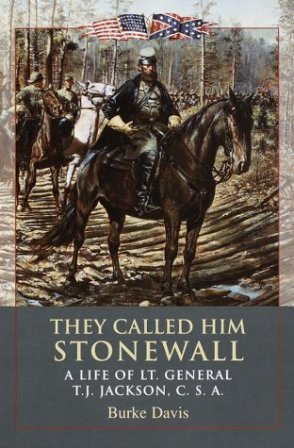
4) Caleb has been
badgering me into teaching him a new cord on the ukulele every day.
Badgering is the wrong word. He is so cute and so deserving that
teaching him is an absolute joy. Don Ho, you better watch out!
5) I let my sutures
get partially infected. Bacitracin, please do your thing.
6) I was asked this
week why I've published with Energion,
a relatively small and new publisher. Why shouldn't I enjoy the
prestigious imprints of the most highly regarded publishers in America?
My answer was, I like Henry Neufeld. All who have come to know him have
learned to trust and honor him. His business is first and foremost a
ministry, and he pushes his books with a youthful initiative and
energy that can't always be expected of an established firm. We'll see
who benefits whom more....
1:06
PM
Today
Matt and
the boys have been digging French drains for our new down spouts.

They're
having more fun than reading a Sarah Palin memoir.
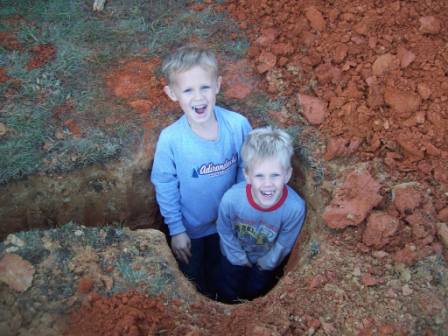
Wish I
could join them but I've got writing to do lol!
12:24
PM
Thus far
N. T. Wright, who just spoke at the annual ETS meeting, seems to be
sipping the adulation of the blogosphere.
Here's one example. I should say the accolades are, for the most
part, well deserved. Wright has stirred up the pot, and I like
stirred-up pots. Moreover, he writes to be understood by everyday
people. He is, in that sense, a popularizer. Of course, popularization
often means skimping on scholarship, or sparing the reader of potholes
in the road. Wright is not a popularizer in that sense. My heart goes
out to the man, so disliked by so many, so respondent to the practical
side of the Christian faith, fighting battles that might have broken the
spirit of a lesser man. In my book Godworld I am toying
with the idea of devoting a chapter to the scholar ("What's Right -- and
Wrong -- with Wright"). But right now I've got to finish Paul,
Apostle of Weakness.
In the
meantime I'll be trying to keep abreast of the fallout from this year's
ETS and SBL meetings in Atlanta, especially the debates being offered
this year. Debates settle nothing, but they are highly entertaining.
8:28
AM
Most people
know that my views about New Testament textual criticism have been
greatly influenced by my former colleague in the Greek Department at
Biola University, Prof. Harry Sturz. Sturz's dissertation (Th.D. Grace
Theological Seminary) was published as
The Byzantine Text-Type and New Testament Textual Criticism.

It is
masterful work. It was written by a scholar for scholars. And it's a
reminder of just how unpredictable scholarship can be at times. Just
when the coaches thought they had their players set up for an off-tackle
thrust, someone seizes the ball and carries it on a wide sweep around
end. This is precisely what happened when Harry Sturz published his
book.
In textual
criticism, one enters a discipline that is as much art as it is science,
so that what is all too clear to one scholar may be opaque to another.
My friend Dan Wallace -- who, incidentally, also took Harry Sturz's
textual criticism class at Biola -- has explained how he
left the Sturzian fold and returned to the camp of the Critical Text
-- much to the joy, I surmise, of the coaching staff.
I have
never changed my mind.
Harry Sturz
had no personal axe to grind. He neither hoped for nor expected any
professional advantages form his work on the Byzantine text. He had been
a student of E. C. Colwell when the latter was still teaching at
Claremont Graduate School in Southern California. Like Colwell, Sturz
always presented his views in a scholarly yet humble way. His work was
not a revelation from Mount Sinai but the considered judgment of an
intelligent, hardworking scholar.
Much to his
credit, Sturz had the temerity to challenge the status quo and to take
up the cudgels of the primary data in search of the truth. His views
were (and still are) diametrically opposed to the conception behind the
Byzantine Priority view and the Critical Text view alike. With the grim
determination of a spawning salmon, he swam up the stream of
scholarship. His total sincerity shows through every page of his work.
His reputation at Biola was such as to compel respect and attention by
all. His conclusion -- that the Byzantine text is not edited or
secondary in the Westcott-Hort sense -- gushed forth from the fountains
of his conviction.
I consider
The Byzantine Text-Type and New Testament Textual Criticism to be
extremely fair with the evidence, and whenever I teach textual criticism
I always require it to be read alongside other standard works in the
field. Sturz's perspective is, I believe, absolutely essential to a
correct estimation of the problem. This is all the more important in our
day, which is characterized by a burgeoning ambivalence toward all
things text-critical. It is the duty of every student of the New
Testament to dig up the skeleton of truth, even if only a dozen people
in the world care about it.
Harry Sturz
was a gentleman to his fingertips. He would never have thought of
imposing his ideas upon his students, who held him in awe. He was a
beaver for work despite his age. Unlike so many scholars of his day (and
ours), he refused to resort to the ark of group-think, scampering up its
gang plank whenever his views were challenged.
Harry
Sturz's The Byzantine Text-Type and New Testament Textual Criticism
is a magnificent tour de force. In my opinion, it seriously
weakens the arguments of both those who elevate the Byzantine text to
a position of unquestioned primacy and those who seek to relegate it to
the academic rubbish heap. All in all, it pulls the rug from under a
great deal of what passes for scholarship today. It is a dangerous book
for a young scholar to read, unless one enjoys coolheaded, impersonal
logic. It is a coda to an investigative symphony, and for the symphony I
am most grateful, even though it remains unfinished.
(This
entry is cross-posted here.)
Friday,
November 19
8:20
PM
Fun
evening with the Rondeaus and Glasses. Matthea's carrot cake was divine.
I should know: I have a "Master of Divinity" ( = all things divine).
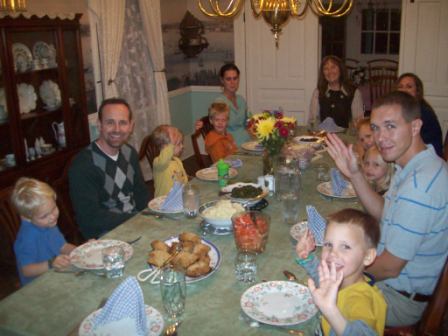
Oh,
another thing Baptists don't do? Dance.
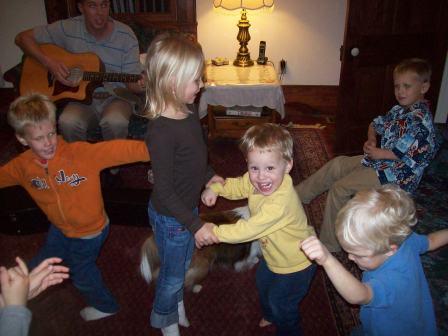
Make
that: dance well.
Time to
cozy up with a book and a fire.
8:03
PM
Nice
post on adolescence.
1:40
PM
This
morning we had Becky's blood drawn in South Boston. It hardly seems
possible that it was 16 months ago that she had her surgery and exactly
12 months ago this week that she was taking her third chemo treatment at
UNC. To say that these past 16 months have been intense would be an
understatement. To say they have been easy would be a downright lie.
Baptists aren't supposed to believe in spiritual warfare. But it exists.
And it's another reason why I love to read the Gospels. They show me
that real demons constantly harassed Jesus, especially when they
realized He could fight back (by quoting Scripture and commanding them
to go away). The Gospels allow me to see that discouragement is not
always psychological in nature. No, I don't think we should
indiscriminately charge the Devil with all of our problems. We must be
careful to assume our share of the responsibility. But extreme spiritual
warfare does exist. And when we face it, I think we must focus on the
cross. At Calvary, Satan tried to destroy Jesus. But that's when the
decisive blow against the devil and his forces was delivered. When Jesus
said, "It is finished," He meant it. The devil's stranglehold on us has
been broken. The Lord has bruised the serpent's head. God defanged Satan
at the cross. I'd give anything to have a before and after picture
showing Satan's face when he discovered that Jesus had won the victory
at Golgotha.
Being so deeply involved in kingdom work, Becky and I realize how hugely
demanding ministry is. We constantly realize the potential impact of sin
to ruin relationships. The challenge is to trust when there is no
apparent change or relief. I know in my own life, the greatest joy and
the greatest pain comes in working with the hurting. Discouragement
tries to demolish hope, but the Lord reminds us that the battle is
already won. His Spirit works courage in us.
I am so
so thankful today for the Gospels. They help me to assess my own life
wisely and biblically. As I go through the day, I am encouraged:
Stop
and look around you. Realize that you are one of the privileged in the
world who can say they are living their dream. Don't lose sight of the
fact that "It is finished." Jesus and you are in this together. And
because you're in this together, you can come before His throne and pour
out your heart. Enjoy the peace and serenity that He provides. Be
anxious for nothing. Christus Victor is still at work in your life.
7:56
AM
Nick
Norelli has posted an excellent review of
The Reformation Study Bible.
7:40
AM
I'm sure
my students will enjoy reading Scot McKnight's The Jesus Creed
next semester. This is the first time I will have required Scot's tome
as a textbook. I am not in agreement with Scot about every area of
biblical interpretation. But what he says in The Jesus Creed is
biblically sound. The point he makes -- and the point I make in The
Jesus Paradigm -- is that the whole purpose of the church can be
summarized in that one word: love. That is what Jesus was all about.
That is what the Gospels are all about. That is what the New Testament
is all about. And that is what the Great Commission is all about. John
says, "If you have this world's goods and see your brother or sister in
need, and shut up your bowels of compassion, how can God's love dwell in
you?" Loving is caring. Caring is sharing. And both caring and sharing
is what missions is all about.
When we
come to this realization, we begin to alter our lifestyle. We learn to
seek first the kingdom of God and to trust Him to use us to further the
Gospel. We make a deliberate decision to let God have total control of
our lives. Suddenly we no longer care so much about attending
conferences or buying books or listening to So-and-So's sermon. We give
up our vain pursuits. We get personally involved in missions. We
go. And if we can't go, we send. Better yet, we come alongside the
church in Asia or Africa and ask, "How can we help you?" For example,
reaching the half million villages of India sounds like an impossibility
until we realize that if just one out of every 92 evangelicals in
America sponsored an indigenous evangelist it would be enough to support
500,000 fulltime missionaries who already know the language and culture.
Love, as Scot shows in his book, should rule among Christians, but one
of the saddest things I see today is that many of us fail to understand
what love is. The Great Commission demands that we work together with
every other Jesus-follower in building the kingdom. This means that
every effort, organization, program, project, pursuit, and building is
to be evaluated in terms of how they contribute to the ultimate mission
of the church. Tragically, more than 95 percent of the total church
budget in the U.S. is spent at home to maintain the status quo rather
than to reach the nations. The Jesus of the Gospels is calling every one
of His followers to break away from his or her culture and live for Him
wholeheartedly. How in the world can we have churches that make monthly
mortgage payments of $100,000 and still claim they don't have anything
for missions? We have shamefully hoarded our resources. We are not
loving as He loved.
The fact
is, many of us are substituting information and knowledge for practical
obedience. And this includes us seminarians. Of all the academic
organizations in the world, the ETS should schedule at its annual
meetings all-day prayer sessions for the lost. How can we, as "biblical"
scholars who claim to love Jesus with all of our heart, soul, strength,
and mind, gather to discuss the Scriptures without considering the
claims of Jesus Christ on our lives? How tragic. Education means
absolutely nothing to God. We can hold doctorates from the most
prestigious universities in the world and still be absolutely useless to
the Lord. That's why it's so important to study the Gospels. The
Jesus-style is the servant-style. He seeks doers, not hearers or
discussers. How I'd love to see Tom Schreiner and Tom Wright, after
debating the NPP, spend a few days together in Addis Ababa serving in an
orphanage (or even working in an inner city mission in Atlanta). What a
message that would send about justification!
Missions
is not just for "the other guy." You can become a world Christian, and
so can I. So must I -- all the more so since I claim to be a
biblical Christian. Think about it. One can know the Gospels and not
give one's best in the cause of Christ. But in God's inverted kingdom,
greatness is defined by our willingness to serve. Blind to social
distinctions and educational attainments, we live as children of God,
holding forth the Word of life to all who will listen. That's why I love
this Jesus of the Gospels. In one stroke He demolishes my hankering
after status. "You are not to be called 'doctor,' for you have one
teacher, and you are all students," He says. This doesn't mean that we
ignore controversies. I once debated Scot at an annual SBL meeting over
the synoptic problem, and I have published my concerns about his
unwavering support for the emerging church. (See
Scot McKnight on the Emerging Church.) The genius of the Gospel is
that it contains within it the seed of reformation. But ultimately, the
kingdom entails a new set of values, and the highest value of all
is loving God and loving others -- the "Jesus Creed."
So the
key question in our Mark class will not be, "Was Mark our earliest
Gospel?" The key questions will be:
-
How can Gospel values
begin to shape our cultural practices irrespective of what country
we live in?
-
What tables does Jesus
want to overturn in our homes, our churches, and our denominations?
-
How can mission work
move beyond do-gooder paternalism?
-
How can we get past
our pious slogans and glamorous magazine covers?
-
How can we claim to
reject pompous power and still retain our honorific titles?
-
Above all, how can we
welcome His reign in our corporate lives each day?
Mammon
clings to us like barnacles on a boat, but Jesus said we cannot love God
and wealth. If the Gospel of Mark teaches anything it is that the
kingdom requires a singularity of focus and energy. It requires fulltime
devotion to Jesus.
I don't
know about you, but I need that reminder daily.
Thursday,
November 18
3:18
PM
Just
finished my farm projects for the day.
1) I dug
up this wild rose bush and replanted it in 5 sections around the farm.
Bec's mom originally planted it in their Burji home over 50 years ago.
Now we will have a remembrance of those happy times.
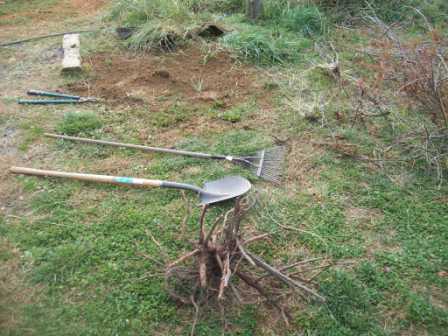
2) One
place we thought would be appropriate for the Burji rose bush was at our
entrance gate.

3) Becky
also asked me to discontinue her tomato plants in the raised garden
beds. That's right -- no more garden fresh tomatoes again until next
summer.

4)
Potholes, potholes, potholes. Time to fill them in!

5)
Finally, here's our resident hat thief. And glove thief. And you-name-it
thief. Nothing is safe from Alpha, the Barbarian.

Right
now Bec and I are getting spruced up to go out to dinner with some dear
friends. Mexico Viejo, here we come!
8:50
AM
Yesterday I listed the books I'm requiring for my Greek 4 class next
semester (Exegesis of Mark). I'm praying about adding Mark Goodacre's
The Case Against Q.
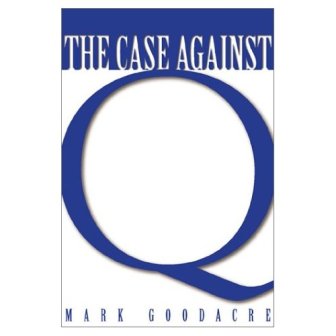
I think
it is a helpful contribution to the status quaestionis. It may
help to underscore the multifaceted character of Gospel studies today.
Besides, I like dissenters. The tide of dissent from the academic
opinions in which many of us were indoctrinated has reached a level
where it can't be ignored. At least on points of chronology and
sequence, Goodacre's work deserves a place in the standard
Einleitungen.
One huge
reservation: The price is truly exorbitant. Can I really justify asking
students to pay $40.00 for a 240-page book? I may have to put the book
on reserve instead and have students read it in the library.
8:05
AM
Good
read:
Four Reasons You Should Resist the New TSA Security Procedures (and How
You Can).
7:36
AM
It's
been some 11 weeks since Bob Cole and I began team teaching our LXX
class. A realistic assessment of the result of the course is difficult.
I can only speak for myself. I am coming away from the course with new
perspectives and viewpoints -- and many new questions. Some of my
previously held assumptions about Old Testament textual criticism have
been strengthened. Others have been considerably weakened. It is very
clear to me that it would be misleading to speak of any general
consensus that is emerging from the class. My guess is that two weeks
from now -- or two months or two years from now -- the impact of the
course will be more in evidence for every participant than it is now.
Yesterday Bob was absent. (He's at ETS.) In his absence I felt a keen
awareness of my own limitations to address certain details of the Hebrew
text. The best I could do was to suggest possible ways of dealing with
it. Again, one of the great values of a course like this is the
possibility of the cross-fertilization of ideas. Much, it seems, is
still up for grabs in Old Testament textual criticism. Perhaps in the
next few years new methods of approaching the present evidence may make
certainly possible. We will see: Veritas filia temporis. For
myself, I hope one day I'll get the hang of this and get it right.
One of
the spin-offs of the class is a new respect for the translators of the
LXX. They were faced with an inordinately difficult task. We, too,
struggle with their renderings today. This struggle can best, and
perhaps only, be carried on in an interdisciplinary context. There is
much that New Testament scholars can learn from specialists in the Old
Testament. Furthermore, even critics of the Old Testament are learning
that their views need to be constantly tested in the light of new
insights and new methods.
And so
the course continues -- a place where, hopefully, profitable dialogue
may happen. I sense a readiness of the part of all of us, teacher and
student alike, to see the whole matter from a new perspective. Education
is ultimately inquiry, and what is happening in our class is perhaps the
best kind of education one can experience.
7:22
AM
As I
worked on my book Why Four Gospels? I was continually reminded of
how many practical lessons Jesus left us with concerning how to live the
Christian life. All of human history hinges on Christ. And that's why
the Gospels are so important. They are written and designed to help us
see Jesus. "That which we have seen and heard, we declare
to you," wrote John the apostle. Jesus wants us to enjoy the
unbelievable privilege of talking with Him daily, of asking Him to guide
us through the turbulent waters of life, and expecting Him to take us
firmly in His arms. We call Him Jesus of Nazareth, but we could also
call Him Jesus of Wake Forest or Jesus of New York City. He is "God with
us." The Gospels paint an awesome picture of all that God has done for
us through Jesus. As I study these ancient documents, I never want to
forget this fact.
Wednesday,
November 17
8:33
PM
Energion
Publications announces a
new academic book line. For obvious reasons, I couldn't be more
excited.
8:10
PM
Here's a
great quote from Allan Bevere:
Christmas is not your
birthday. It is not mine. But judging from the way we observe the
holiday each year, one would think otherwise.
Read
Whatever Happened to the Thanksgiving Season?
7:38
PM
Speaking
of school, I want to thank Yamin Park for his gracious invitation to
dine with him and his sweet family last night in student housing. Yamin
also did an excellent job of leading the discussion of Ruth 4:1-12 in
our LXX class today. We dug deeply into both the Greek and Hebrew.
Delightful!
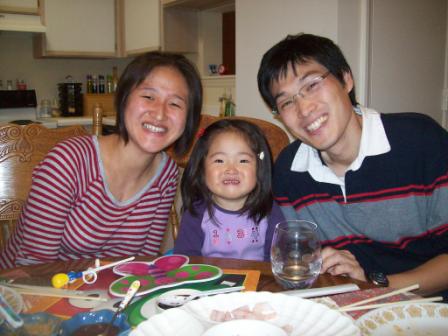
7:22
PM
I've
just finished writing the syllabus for my Greek 4 class that meets next
semester. One issue we'll discuss is the synoptic problem. I'll admit
that there isn't sufficient evidence to prove Matthean priority beyond
the shadow of a doubt. Nor will the scholarly community be willing to
dispense with "Q" any time soon, despite the valiant efforts of Dr.
Goodacre. Nevertheless, I believe -- and am quite ready to try and prove
-- that the Fourfold-Gospel Hypothesis presented in my book
Why Four Gospels? presents a more credible example of the
relationships among the Gospels of Matthew, Mark, and Luke that do any
of the other "solutions" to the synoptic problem.
Many
have commended my work in recent days because they feel it is no more
complex than absolutely necessary -- thus applying Ockham's razor. I
agree with this assessment, to a degree. A simpler explanation is not
inherently a better one. I would argue, however, that we should not
appeal to unknown sources or hypothecated documents unless we
have been unable to understand the relationships between Matthew, Mark,
and Luke without them. This does not mean that the Fourfold-Gospel
Hypothesis now becomes more probable. Perhaps I have missed something in
my analysis of the raw data. It is therefore necessary for students of
the synoptic problem to give attention to concrete problems inherent in
any view of synoptic relationships.
This we
shall do next semester as we exegete the Gospel according to Mark in
Greek. I rather suspect that when and if our view of the synoptic
problem becomes accepted, it will be because students have examined the
evidence for themselves. My proposal is that we analyze the Gospels just
as we would any other ancient document. It seems to me to be the
eminently intelligent thing to do. We do ourselves a disservice if we
take umbrage at the challenges posed to us by history. As a teacher,
then, it is my aim to get my students deep into the text itself. Thus, I
am basically optimistic about the class, in which I hope to tackle the
full range of research problems in contemporary Gospel studies while at
the same time seeking to open a new way of understanding the Christian
Gospels in the earliest period of church history.
I hope
many of you SEBTS students will consider joining us in this quest. Of
course, our ultimate goal is to better assess
the
historical figure who lies behind the four characterizations in the
Gospels and His relevance for us today. Thus books like Scot McKnight's
The Jesus Creed and my own
The Jesus Paradigm find their place among the works that we will
want to read for the class. The time is ripe for a fresh assessment of
the data, with a goal of strengthening the Body of Christ for the work
of disciple-making worldwide.
For your
information I publish here a portion of the syllabus I just posted to
the seminary website. This is subject to change, of course, prior to the
beginning of the class.
Required Textbooks
Rethinking the Synoptic Problem (D. Beck and D. A. Black, eds.; Baker).
Why Four Gospels? (D. A. Black; Energion).
Perspectives on the Ending of Mark (D. A. Black, ed.; B & H).
The Gospel of Mark: New International Commentary on the Greek Testament (R. T. France; Eerdmans).
The Jesus Paradigm (D. A. Black; Energion).
The Jesus Creed (S. McKnight; Zondervan).
The following work is required for this class.
- An interpretive translation (i.e. paraphrase) of the book of Mark based on the Greek text. Please bring your completed translations and parsing to class, along with any interpretive and exegetical notes gained from reading your commentary and other exegetical and homiletical resources. In preparing your translations you may use any helps available to you, but your final translation must be your own. A translation schedule will be made available on the first day of class.
- Class presentations. Each student will lead (at least once, depending on class size) the class discussion over a section from Mark. Please send to the class (via email) at least two days prior to your session an overview of your presentation.
- A final exam covering translation and parsing from anywhere in the book of Mark, without the use of helps.
Monday,
November 15
8:11
PM
Thanks
to Becky Lynn, I just enjoyed my first glass of eggnog this winter.
There is no comparable beverage on this planet.
7:58
PM
Biola,
where I studied and then taught from 1971-1998, announces an opening in
their Honors
Program. Don't worry too much about relocating to Southern
California. Other than the fires, floods, riots, earthquakes, and smog,
it ain't a bad place to live.

7:40
PM
Oh,
this is way too funny! Stop by and you may win the big prize for
yourself!
7:28
PM
Right
now I'm facing a situation that requires gobs of spiritual wisdom to
deal with. I keep telling myself, Don't snatch things out of God's
hands, Dave. Instead, I've been praying:
Thank
you, God, for allowing this trial to come into my life right now. I know
you are doing a splendid job of managing my life, and this is but one
more element in your perfection/maturity program for me. Through it you
will help me to become a little more like Jesus. Show me what I should
do, and help me to be patient until you do.
If
you're facing a similar trial, I urge you to try this solution!
6:55
PM
This
week will be a very busy one on campus. I'm meeting with a prospective
Ph.D. student, mentoring current ones, writing exams, submitting
textbook orders for the spring semester, grading term papers, teaching 4
classes, sending a ms. to a publisher, and typing up the final chapter
to Paul, Apostle of Weakness. In the midst of it all I need to
find times for more deep prayer. You can't spontaneously produce
quality. It happens only through an intimate love relationship with God
through Jesus.
6:43
PM
Over
dinner tonight B mentioned
this BBC
news story about the airlift of 8,000 Falashas from Ethiopia to
Israel. That can't be possible, I thought to myself. I believed
that all the Jews had been relocated to Israel years ago. But it's no
joke. And no laughing matter. Lord, please have mercy on them all.
6:40
PM
Great
news! Maurice Robinson is out of surgery and recovering nicely in the
CCU at Wake Med. Let's not stop interceding for him now!
4:08
PM
Taking
my bride out to dinner. She loves the salads at Ruby Tuesdays.
4:05
PM
The
College of the Ozarks announces an opening in
Biblical Studies.
4:02
PM
My, how
idiosyncratic I feel sometimes. I'm glad it's okay to be different. I'm
glad that Jesus calls me by name. I'm glad that He knows me inside and
out, just like a good shepherd knows his sheep. I'm as different from
you (or from any other human being for that matter) as night is from
day. We're all different, and the exciting thing is that God
knows that and treats us according to our own temperaments and
personalities.
Sometimes all we need is a little look at the animal world to understand
this. My dogs Sheba and Dayda couldn't be more different. Sheba is a
natural leader and a fearless hunter, but she knows her limitations and
always checks in with me before going anywhere. Dayda, on the other
hand, must be part dodo bird -- she acts before she thinks and would run
off in an eye blink if I turned my back on her. Jesus had John the Son
of Thunder and Peter the Impulsive, and I have my Sheba and Dayda.
Jesus
not only knows my name ("Dave Black" -- let's see, a Sheba or a
Dayda?); he also knows my needs. When I doubt His promises He
understands. He knows my frailties and my idiosyncrasies as a human
being. He always has my best interests in mind, even when the path seems
so unclear. When I'm sad and discouraged I don't have to do a back flip
to get His attention. All I have to do is go to Him and receive all the
help I need for whatever problem I'm facing.
It's
moments like these, when I face the limitations of my own personality
and temperament, that I look around in wonder at the extravagant love
Jesus has for me. He says, I know my sheep. What a fantastic
promise. It's a little word of encouragement that lasts for a long, long
time.
For
eternity even.
1:16
PM
On the
last 12 verses of Mark:
How, then, does one explain how the
last twelve verses (Mark 16:9–20), which describe the resurrection,
were added to the Gospel? Some manuscripts record these verses,
while others either omit them altogether or give a much shorter
ending. The most plausible explanation is that after Mark had
satisfied the immediate demand of those who wanted copies of the
five discourses, which ended at Mark 16:8, the matter rested there
until after the martyrdom of Peter and Mark’s decision to go off to
establish the church of Alexandria (67–69). As an act of piety to
the memory of Peter, Mark then decided to publish an edition of the
text that included the necessary sequel to the passion and death of
Jesus.
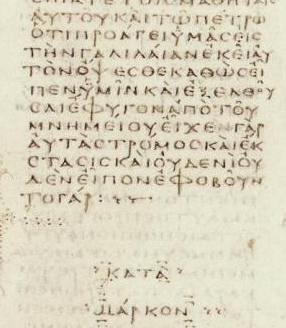
From
Why Four Gospels?
12:52
PM
I ain't
got it. Hermann Binder, in his essay "Die angebliche Krankheit des
Paulus" (TZ 32), argues that Paul's weakness referred to in Gal.
4:13 cannot be purely physical because "in the language Paul,
astheneia never means 'illness' but always 'weakness,'
'powerlessness.'" In short, Binder expresses the "fact" that Paul never
uses astheneia or its cognates to refer to a physical condition
and concludes from this that therefore Paul cannot have bodily infirmity
in mind in Gal 4:13. Binder's argument at this point is a pure
petitio principii. His conclusion is not surprising since it was
also his premise! Just read 2 Tim. 4:20 (Trophimus) or 1 Tim. 5:23
(Timothy) or Phil 2:26-27 (Epaphroditus) and you will see that the word
group can indeed refer to a physical sickness of some sort.
On to my
next essay....
11:45
AM
Today
I'm trying to bring up to date about 26 years of Pauline scholarship on
the subject of weakness. I hope this new section of Paul, Apostle of
Weakness will meet a need in the academic community and beyond. I'm
feeling downright mopey right now so I might not get very far. I find
writing both fascinating and frustrating, much like public speaking.
Is there
an emoticon for what I'm feeling?
11:17
AM
Many
students go on to seminary only to find that's where their missionary
vision ends. The goal becomes "serve God and live a fulfilled Christian
life." This is one of the greatest deceptions of our time. God is
calling us to live our lives totally and radically for Him and His
kingdom, regardless of our educational attainments. Seminary student,
are you willing to do that?
9:50
AM
My
esteemed colleague Maurice Robinson is having quadruple bypass surgery
today. Your prayers are appreciated.
9:25
AM
Potpourri:
1) Becky
tells stories about the persecuted church:
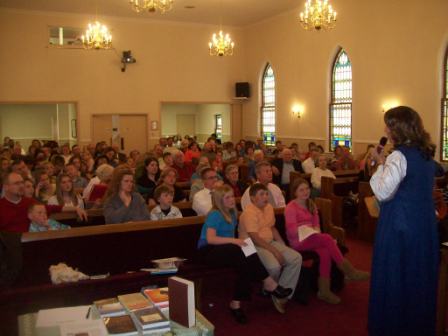
2) Our youth highlighted the
suffering taking place in other nations. The slide says, "Heavenly
Rainbow, Age 11, North Korea."
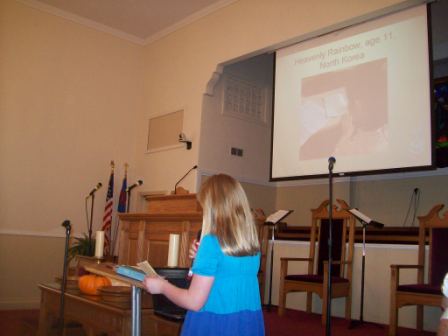
3) My buddy Woody Jacobs. He
told me, "Dave, I enjoy telling my brothers 'I love you.'"
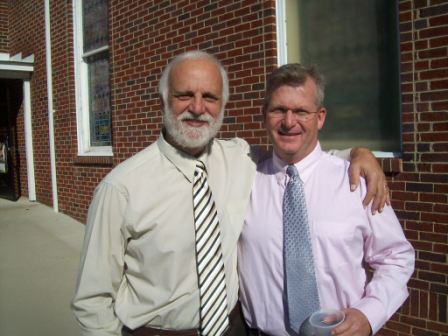
4) Nate, Jess, and Nolan
stopped by last night for a visit.
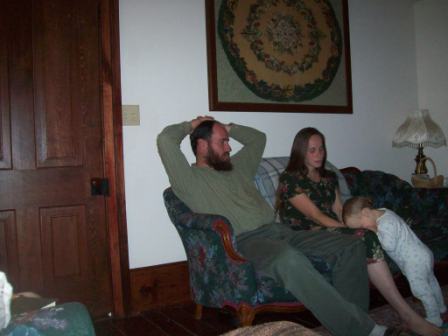
5) What a charmer -- that
Nolan.
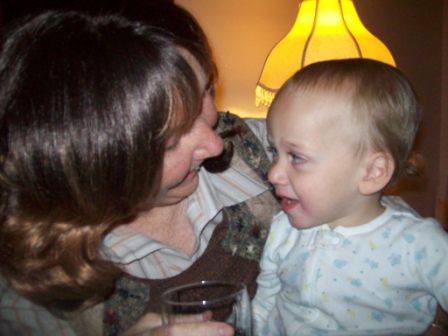
6) Mr. Blue Eyes in all his
glory.

7) I'm giving Caleb ukulele
lessons on my old Kamaka uke, which I was given when I was his age.

8) Today he learned the G7
cord. His repertory now consists of C, F, and G7. Just think of all the
songs he can now play, including "Pearly Shells."

9:15
AM
Yesterday Becky did a fantastic job of calling our attention to the
plight of the world's persecuted. (I also taught from Phil. 1:27-30. I
wasn't sure I was able to get my point across, but I tried. Both faith
and suffering are gifts of God.) Today I keep thinking about all the
adventures that B and I have spent together in Africa. All the suffering
we've witnessed. All the poverty we've shared. All the persecution we've
seen -- and been the target of. It's funny, really, that we here in
North America should make such a big deal about "Persecution Sunday"
when much of the rest of the world is having Persecution Monday today
and will have Persecution Tuesday tomorrow. It's a measure of just how
easy life is here. So easy that we have to focus on others'
trials. Yesterday's meeting seems a little bittersweet today. I realize
how quickly I can grow accustomed to my American lifestyle. It's at
moments like this that I wonder what world I belong to. I see the wealth
and prosperity of my own culture, and then I travel (in my mind's eye)
across the world and see the troubled waters stirred up by the enemies
of Christianity. And to make things more complicated, you're faced with
the uncertainty of not knowing whether you will ever be able to take
your Ethiopian bride back to the place of her childhood.
Nevertheless, yesterday was a good, good day. Bethel Hill, thank you for
allowing Becky and me to share the truth about suffering and persecution
with you. We can't wait to get back to "Utopia" and share the work and
the danger again.
Sometimes I feel like serving Jesus is like eating a big bowl of ice
cream. I'd like a bigger bowl, please.
Saturday,
November 13
6:16
PM
It's
going to be a very long time before I forget today. What's an Ethiopia
team reunion like? Imagine a group of Iraq War vets sitting around in
someone's living room in the States. There are chatting amiably. Their
feelings come out naturally. They are beginning to "process" their
experiences. Together.
A Band
of Brothers.
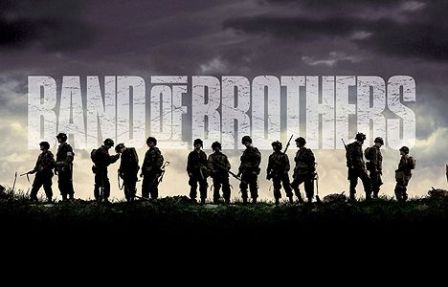
It hit
me today. That's exactly what we are.
A Band
of Brothers.
Our
common experience has forged an unbreakable bond between us. In a word,
we are vets of a gigantic spiritual battle that is raging all over
Ethiopia. And if you've never been there -- if you've never felt what
we've felt or seen what we've seen or done what we've done -- you will
never be able to understand us. It's just impossible. All this
translates into the fact that the bonds of missionary service are so
tight that, well, it's just about impossible to explain it in words.
A Band
of Brothers.
For some
of us, this means happy memories. Our deployment wasn't too bad. Nothing
very traumatic. Except maybe watching the walking wounded. For others,
however, there's a heavy price that has been paid. Either way, we're
open and honest with each other. Our hearts ache for Ethiopia. We cry
out to God on behalf of our family there. We're ready to kick it into
high gear and get back to the war zone. It's a job we find incredibly
invigorating and enervating, all at the same time. Our hearts sing
because Jesus has counted us -- unworthy us! -- to be His servants in
Africa!
I love
being a missionary to Ethiopia. It's the most wonderful, most
exasperating, most difficult, most exhilarating job in all the world.
There are no exceptions. Mission work is riding a roller coaster with
all of its surprises and sudden jolts. It's terrific and terrifying.
Sometimes it's so fast that I want to cry "Whiplash!"
I also
love my teammates. All these knights in shining armor. All these normal
brothers and sisters who live humdrum lives (as I do) and then place it
all on the line for Jesus. My thanks to each team member who came today.
My love to each who couldn't make it. You were missed. To everyone who
attended: Thanks for letting me pour out my heart to you. I knew you
would understand. And thanks for sharing with me your thoughts and
dreams too. Feel free to do that at any time. After all, we are a band
of brothers.
Semper
Fi!
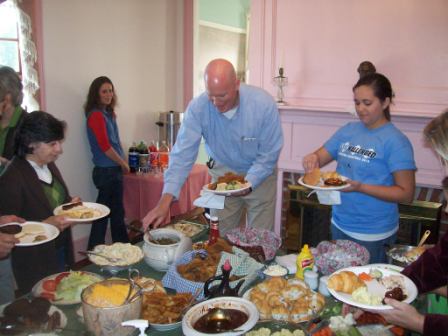
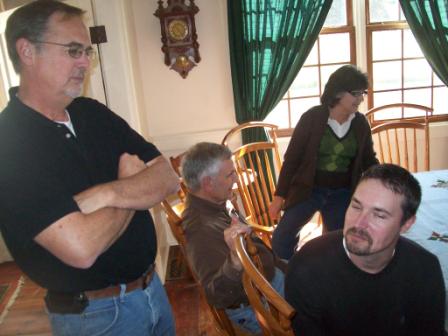
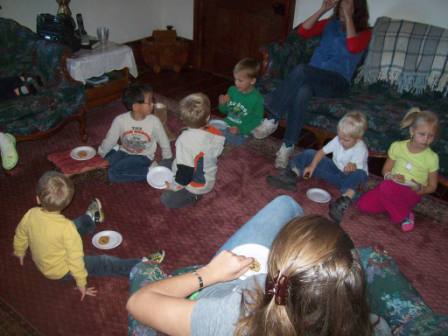
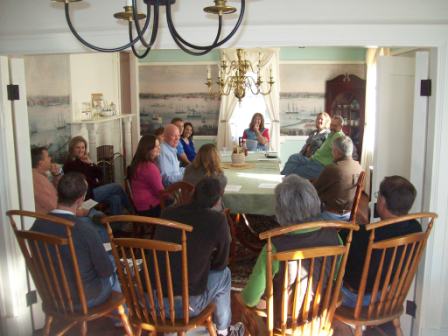
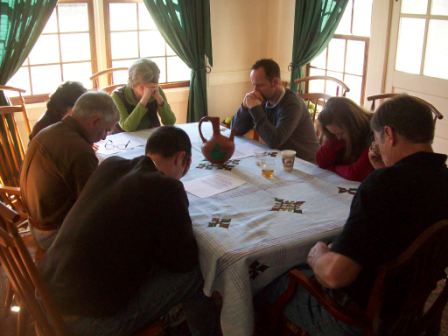
5:12
PM
Oh, how
wise, this
Clement of Alexandria!
This, then, is the
mark of the man, the beard. By this, he is seen to be a man. It is
older than Eve. It is the token of the superior nature….It is
therefore unholy to desecrate the symbol of manhood, hairiness.
7:55
AM
Ethiopians are caught between two cultures -- the disappearing one of
their forefathers and the rapidly emerging world of today based on
Western "values." I imagine this struggle will make for interesting
conversation today during our Ethiopia team reunion. Actually, we
Christians in North America are also caught between two cultures
-- one that makes education, birth, status, health, and success primary,
and one that requires that we share our lives with others and thus lay
the foundations of Gospel witness and work. Oh, what a high view of the
lost we must have and we must teach! It must be second only to our
affection for the Savior Himself!
Below:
Dr. Rick greets a new patient at our makeshift health clinic in Gujiland
last summer.
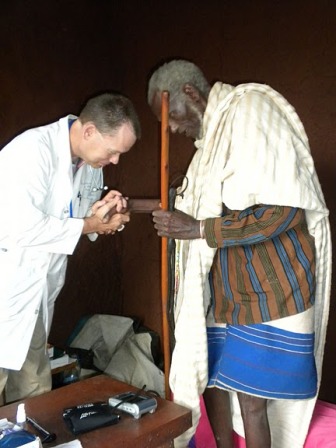
For the
Gujis, having a medical doctor in their midst was the greatest thing
since sliced bread. Oh, wait a minute: there is no sliced bread in
Gujiland!
7:35
AM
Over at
the Alpha and Omega Blog, Jamin Hubner's
essay on "Q"
is well worth your time. His conclusions?
Q is entirely
unfounded. If such a source existed that the two gospels depended
on, we would expect to see at least one manuscript, or
one reference to it in early church tradition (there are 5,700+
manuscripts of the NT, 2,360+ of which are gospels). But there
simply are none; there is no hard evidence whatsoever that Q even
existed.
Amen!
But then we read
this:
It's possible Mark
was written last out of the three. But that's highly unlikely - why
would a compilation of accounts be the smallest account? Why would
it exclude the majority of Jesus' teaching? Why then does Matthew
and Luke agree less than Mark agrees with Luke and Matthew? Why does
Mark have a more awkward and primitive style? etc.
I've tried to
answer these questions in
Why Four Gospels? Any blogger who would like a free review copy can
contact the publisher at
pubs@energion.com.
Friday,
November 12
7:44
PM
Here's a
great interview with a wonderful fellow and one of my all-time
favorite bloggers.
7:35
PM
Had
Chinese stir fry for supper tonight. Caleb and Isaac cooked it. I
helped. Sort of. It was great. Afterwards Becky and I snuck out to the
front porch and had some key lime pie together, talking about the day's
events. Then Liz brought us some hot tea. Right now Bec's making potato
salad for tomorrow's reunion. I'm reading a book about the Pearl Harbor
attack. The Rondeaus are watching an episode of Little House on the
Prairie.
Family.
Love. Peace. Joy. Jesus.
2:09
PM
Before I
forget: Energion Publications has announced the forthcoming release of a
new book on the
missionary theology of John Piper. I have read the manuscript and am
eager for the book to be in print. I'm also glad to see yet another of
our SEBTS grads publishing his research.
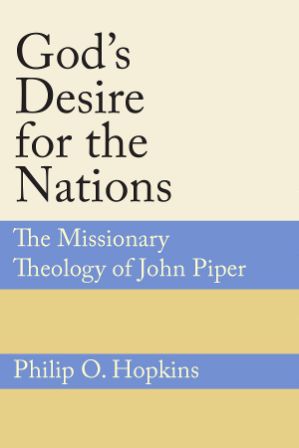
Now
it's nap time!
1:38
PM
Becky
and Lizzy (I love diminutives!) have gone off to South Boston for lunch
and shopping. I'm going off to bed for a short nap. I think I deserve
it. Got tons done today but how much more awaits to be accomplished.
Make me Thy fuel, Thou Flame of God!
1:32
PM
Thanks
to Rod Decker I now
have another essential web
resource bookmarked.
12:40
PM
The
surgeon just called me with the news. "Extremely benign" were his words.
Yes, I am rejoicing. Yes, I'm relieved. And yes, I'm grateful for your
prayers. Very grateful. The bottom line: God is still changing me
into His image, and He's still got a lot of work to do. It's going to
involve mountaintops (like today) as well as valleys. No matter what --
we've got to keep moving forward.
When I
was a child in Hawaii I dreamt of going places and seeing things. I'm
going to see the Great Pyramids. I'm going to touch the pillars of the
Parthenon. I'm going to walk sedately on the Great Wall of China. I'm
going to visit Buddhist temples in Korea. I'm going to visit the British
Museum and the Eiffel Tower and the Gutenberg Museum and Vatican City
and the Swiss Alps and India and Persepolis and the Euphrates River. I'm
going to do all that and a thousand things more.
So here
I am today, having done all those things and thinking, None of this
can compare to feeling one small ray of light penetrate the darkness of
a soul.
I forget
sometimes just how simple life is. You get up in the morning, and you go
to bed at night. In between, you watch God work miracle after miracle
after miracle. The kind of a miracle I experienced today when He
whispered to me through the phone, "Extremely benign." Or when He
allowed me to look in the eyes of my wife and see grace and love. Or
when He spoke to me through your kind email.
Yes,
miracle after miracle....
10:48
AM
We're
still getting tomatoes from our garden. Unbelievable.

10:45
AM
I
suspect that the silly "pay-for-your-projector" controversy at SBL will
blow over as soon as another hideous injustice comes to light. I think
God understands this quirk of human nature, our proclivity to focus on
the dark in the face of all the light. The real purpose of attending
annual meetings, as everyone knows, is (1) to network and make new
friends and (2) to buy books. Otherwise, SBL is hardly an anarchist
utopia. The better papers will inevitably be published (either in print
or online), but it's the opportunity to meet your potential doctoral
advisor or a colleague from another institution that would be the real
attraction for me if I were a younger attendee. When I was much younger
I took this advice, with some good results, and William Farmer was only
one of several scientific saints who honored me with his friendship as a
result. I was still charmed by that word "dream," oblivious to the fact
that a dream is only what we have fashioned in our wishful fantasies. I
rashly took on a larger commitment than I should have by agreeing to
review numerous books, but I defended my rashness by pointing out to
myself that I desperately needed the shrift. Today, whenever I am able
to attend an annual meeting, I am awed by the joviality of
freshly-minted Ph.D.s and amused at the simplicity of these young
world-shakers. I am not saying that one shouldn't attend any of the
paper sessions. Some presenters at ETS and SBL may have originality; one
or two may have genius. In my early days my friends and I would
sometimes duel over the question, "Who are the 5 greatest New Testament
scholars in attendance?" We were just like any other young scholars,
drunk with life. My favorite scholars weren't always the famous ones. I
sought out those who used hammer phrases, who could concentrate an idea
like a blow on the head. I also enjoyed scholars who kept me au
courant with modern trends in the field.
In any
case, I wish all the SBL attendees well this year, whether or not they
are able adapt to the projector policy. I'm sorry I'll have to miss your
company.
9:10
AM
For the
past few weeks my mind has been deeply afflicted by questions as I've
worked on my book Godworld: Enter at Your Own Risk.
-
In what way was Jesus
political?
-
What kind of kingdom
did Jesus establish through His life, death, and resurrection?
-
How did He relate to
the political movements of His day? (There were four of them: the
political establishment = the Sadducees; the religious establishment
= the Pharisees; the isolationists = the Essenes; and the
revolutionaries = the Zealots.)
-
Is the concept of
peace central or only peripheral to His teaching?
I will
spend a chapter exploring the proprietary of flying the nation's flag in
our church buildings, seeking to answer the question: How does placing
the Stars and Stripes in our churches contribute to the edification of
the Body? If it is not a symbol of Christianity, what is its
purpose? What does it say about the separation of church and state? And
do we not tamper with the truth that the church is above nation and race
by flying it? Inevitably questions about just war theory are also being
raised. Are Christian pacifists correct when they say, in effect, that
self-interest prevents us from being able to declare when a war is just?
Questions, questions, questions. George MacDonald wrote:
Into this troubled world Jesus was born.
They all were looking for a king
To
slay their foes and lift them high.
Thou camest, a little baby thing
That made a woman cry.
So if
the only reason I'm writing this book is so that I can work through
these issues on my own, I think that's enough. It's enough because even
if I never publish another book I know this Little Baby Thing who is
Lord and King and Ruler and whom I am willing to serve in His Great
Cause, until death if necessary.
8:22
AM
Well,
I've finished revising all 5 chapters of Paul, Apostle of Weakness.
The flurry of activity is over. I think it's time I stopped and asked,
What is the purpose of all of this? What am I trying to accomplish?
Is all of this necessary?
I've
noticed that when people face medical challenges they tend to pause and
rethink their priorities. They reevaluate their lives. Right now I sense
the Lord is telling me exactly the same thing that Paul said to Timothy:
"The hard-working farmer must be the first to partake of the crops" (2
Tim. 2:6).
Slow
down, Dave, and take time to feed yourself. Weakness is not just a
theological subject to be studied and written about. You need to take in
before you give out ("give out" in both senses).
There's a time to work and a time to rest. Right now it's time for you
to draw strength from Him. Put Him first. Give Him the preeminence.
And
then all these things will be added unto you.
Thursday,
November 11
4:38
PM
Greek students, here's
some real
wit and wisdom from Moises Silva. Nobody says it better.
4:27
PM
Just
back from a walk to the mailbox. Got this Saturday on my mind. You gotta
really love our Ethiopia teammates.

Many had
never been out of the state before let alone out of the country. For
some of them, living on the edge meant jaywalking. Not anymore. I
sometimes forget just how frightening Africa can be to newcomers. But
God has a way of yanking us out of our comfortable homes and putting us
into impossible situations so that we would gather our courage and step
out in faith. And it's true. When you try something that's so big only
God can do it, you quickly discover what living by faith is all about.
You
ought to try it.
1:16
PM
Back to
revising Paul, Apostle of Weakness. I'm enjoying this.
1:05
PM
Greek
tongue twister?
12:55
PM
New job
openings:
12:48
PM
On the
circulation of Mark in the early church:
It is thus clear that
Peter was personally responsible for the text of our Gospel of Mark
and that it was composed not only after Matthew and Luke, but also
with their aid. However, despite its being highly prized by the
church as the personal reminiscences of Peter, it did not enjoy
universal circulation because it was not intended to supersede
either Matthew or Luke. Indeed, it is rarely quoted by the early
fathers, and the first commentary on it dates from only the fifth
century. Its process of composition was quite unlike that of Matthew
or Luke, and Peter had no intention of making it into a third
Gospel.
From
Why Four Gospels?
12:42
PM
Two
quotes about politics from
The Jesus Paradigm:
The evangelical
subculture, which prizes conformity above all else, doesn’t suffer
rebels gladly, and it is especially intolerant of anyone with the
temerity to challenge the shibboleths of the Religious Right.
Randall
Balmer
One is either a good
German or a good Christian. It is impossible to be both at the same
time.
Adolph
Hitler
12:23
PM
I'm
sorry to admit it, but Bradford Hall is fast becoming a glutton's
paradise. Waffles this morning, pork over rice last night for supper,
and just now I ate a wonderful casserole. I can hardly express the
gratitude I feel toward all the chefs we have here. I shouldn't be
saying this, but I am very fast eater and thus a really bad example for
the boys. I can vie in eating prowess with anyone at the table.
Occasionally the boys can score over me in the dessert department, but
otherwise we are neck and neck. At any rate, meal time is never dull or
boring here at the farm. I think eating must be one of my spiritual
gifts.
8:28
AM
Only 2
days until our Ethiopia team reunion here at the farm. I could not be
more excited. When Jim Elliott reached the Auca Indians he wrote in his
diary: "My joy is full. Oh how blind it would have been to reject the
leading of these days. How it has changed the course of life for me and
added such a host of joys!"
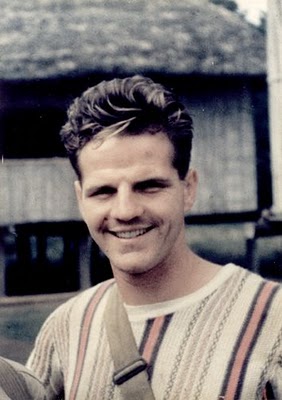
I think
every team member could say exactly the same thing.
8:14
AM
Calling
all my Hebrews students! For an overview of the papers on Hebrews at
this year's SBL meeting, go
here. The
discussion about "Irenaeus and Hebrews" should be especially
interesting.
7:47
AM
Mark as
the interpres of Peter:
Indeed, it is the modern critics,
blinded by their conviction of the priority of Mark, who have failed
to accept the obvious message of the patristic evidence. That is why
they have misunderstood the significance of the texts that always
describe the disciple Mark as the go-between or agent of Peter and
never as the author; yet the critics ignore this and make him out to
be a writer who remembers what Peter said and not simply the agent
for the recording of Peter’s lectures.
From
Why Four Gospels?
7:26
AM
It's
been 7 years since everything changed.
I had
been hearing about missionaries all of my life. And now I'm the
GIF, the Guy In Africa, that eccentric person who can't feel
comfortable among opulence any more, who stays up half the night
thinking about a sick child in Alaba or a suffering woman in Burji or a
persecuted evangelist in Gondar. I don't ever want to lose this feeling,
this marveling at the world, this attraction to a country called
Black-Faced (Ethiopia) filled with outcasts and dying people and babies
suffering from malaria and women needing fistula surgery, this nation of
80 million people worshiping their trees or their saints or their false
gods. I never want to forget how incredibly small you feel when you're
trying to bring medical supplies through customs or watching the
heart-wrenching poverty or scooping up a half-naked infant or standing
next to the graves of missionaries from past generations who went out to
the field and never came back home (or was it ever "home" for them
again?). Can you
imagine what would happen if Christians in America were to grasp the
principle of sharing what they have to meet the needs of the Gospel
around the world? Can you imagine what the impact would be if we stopped
spending 95 percent of our church budgets on ourselves? Can you imagine
the change it would make if we lived a lifestyle that matched our
responsibility to a lost and dying world? Seven years ago my lifestyle
was up from grabs. Every thought and every action was tested by the
simple teachings of Scripture. I decided, along with Becky, that I would
lay up no treasure for myself on this earth. Suddenly I was free -- free
from my bondage to material things, free to allow God to use me -- a
nobody -- to be His hands and feet and arms in Africa.
Seven
years ago.
How I
wish it were longer.
Wednesday,
November 10
6:57
PM
Mark as
an enabling document:
Matthew is the
fundamental Gospel and the most important, but each was written and
published in response to a particular need of the church in a
particular historical situation. The real significance of Mark lies
in Peter’s guarantee that Luke was fit to be read beside Matthew in
the churches of both Peter and Paul. Mark is therefore to be viewed
as the bridge between Matthew and Luke, that is, as a document
enabling Luke’s Gospel to be used freely in all the churches to
which the authority of Peter, the chief eyewitness, extended; and it
stands as a recognition of the equality of the Gentiles in all the
churches.
From
Why Four Gospels?
1:30
PM
Just
wrote an essay in light of Veterans Sunday and Persecution Sunday (both
are coming up this weekend). It's called
The Persecuted Church: An Obstreperous Flower.
12:02
PM
A few
fun farm fotos:
1) Micah
hard at work in the library of Bradford Hall.
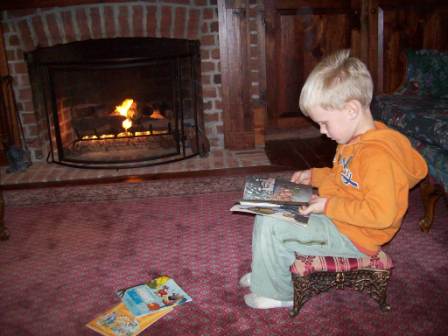
2) My
project du jour.
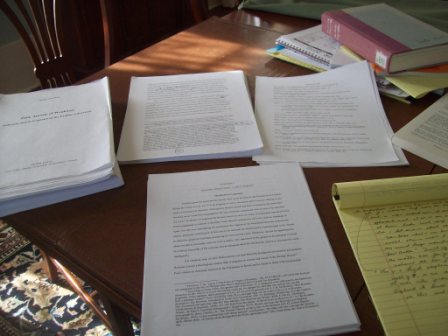
3)
Changes galore.
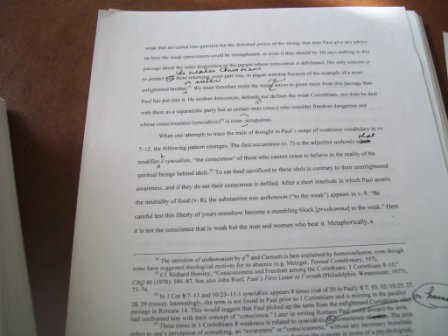
4) An
unsolicited promo for Clarkesville Painting Co., which is doing a superb
job on our roof.

Time for
lunch!
11:50
AM
In
medical news, we are now hoping to send Ayelech to Addis Ababa for a
mammogram before having her treated in Soddu. This is a highly
complicated task, so pray for us, will you, as we arrange the logistics.
The more who pray the merrier. I want Ayelech to know she is being loved
on by her family on this side of Planet Earth.
(And, in
other medical news, I am still doing splendidly well. I am in awe at how
quickly the human body heals itself. Needless to say, I am looking
forward to hearing the results of the tests being run on that small part
of Dave Black that was removed on Monday. In reality, there is nothing I
can do about it, least of all worry. My mind keeps wandering to Aslan in
"The Last Battle." Further up and further on. No matter how far
you go in the Christian life you can never exhaust the love of the one
who conquered sin and death.)
9:51
AM
If
you're planning on getting a dog be sure NOT to get a Sheltie. They are
thieves. They'll steal your heart in a minute. Shelties are the most
beautiful, affectionate, and obedient (sometimes) dogs in the world.
Don't say I didn't warn you.

8:33
AM
I've
finished editing
Ultimate Allegiance. Now it's on to my revision of Paul, Apostle
of Weakness, Lord willing.
8:31
AM
Throughout Scripture we see that God uses men and women who were utterly
dependent upon Him. God reveals His glory and power through the weak
things of the world. Elijah was very human, yet he raised the dead.
Students, walk in His power today. Live prayerfully, as Jesus did.
Voluntarily go out of your way to accept assignments that involve
suffering. Remember: The only real truth is truth that is lived out.
8:22
AM
Why four
and only four Gospels?
We may thus sum up the
relationships between the Gospels as follows:
-
Matthew was composed to meet the
urgent needs of the primitive church of Jerusalem (the church set up
by Peter and the original apostles), which needed a manifesto
defending its integrity and its right to exist in the earliest days.
-
Luke was written at the request of
Paul to meet the urgent need of his churches to have their own
manifesto to prove their full equality with Jewish Christians.
-
Mark was the result of the
collaboration of Peter and Paul to make sure that the spiritual and
doctrinal unity of the universal church was not impaired as a result
of the appearance of Luke beside Matthew in the churches of both.
-
And John made it clear that the
primary objective of Jesus throughout his public ministry was the
winning over of the spiritual authorities in Jerusalem.
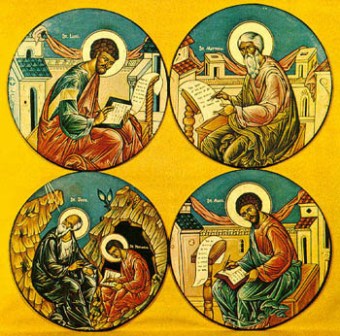
From
Why Four Gospels?
8:12
AM
Just ran
across
this interesting conversation about where to get a Ph.D. in
theology. My alma mater is discussed (in passing). Note: One commentator
is absolutely correct in saying that language requirements are higher on
the continent than probably anywhere else. When I studied in Basel it
was simply assumed that one had a good working knowledge of Greek ,
Hebrew, Latin, German, French, and other languages as well. In my
dissertation I quoted Dutch authors in Dutch and Spanish authors in
Spanish. And why not? This is the doctoral level, isn't it?
Tuesday,
November 9
7:04
PM
Becky
surprised us with key lime pine tonight in honor of my surgery.
Delicious. Key lime pie will be in heaven. Guaranteed.
7:00
PM
On the
assumptions of Markan priority:
In short, the Markan priority
hypothesis is based on a number of dubious assumptions, for example,
that things are not as the fathers perceived them; that Matthew and
Luke are, despite appearances, secondary to Mark; and that the
hypothetical source Q was a vitally important document in the first
fifty years after the resurrection but was lost through shocking
carelessness.
From
Why Four Gospels?
6:28
PM
Got this
email:
This morning I have
talked to Tilahun by phone. All of them are doing very well. Aberesh
is also doing very well. She is recovered. Now every thing is
normal.
Praise
God from whom all blessings flow.
5:22
PM
It was
too beautiful to stay indoors today. So the doggies took me on a nice
short walk -- between naps of course :)



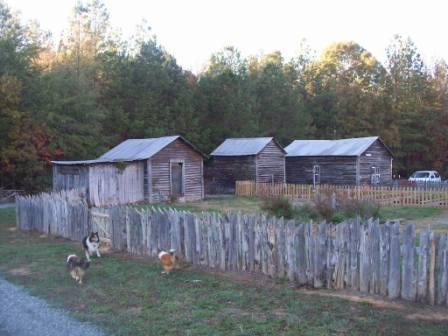
5:12
PM
Two good
reads:
1) Alan
Knox:
Did
She Really Mean That?
2)
Thomas Hudgins:
At 12
Years Old.
And yes,
there is a common thread.
1:57
PM
Becky
and I are a tag team. I take a nap, then she takes a nap, then I take a
nap....
10:10
AM
My
publisher just sent me a link to
this review. Meanwhile, my body just said Get back to bed.
Your obedient servant ...
9:55
AM
I love
UNC Hospital. From the admitting personnel (who laughed at my little
suitcase calling it my "money bag") to the nurses (who smiled when I
told them I was here on a hot date with my chemo-taking wife) to the lab
tech (who got a kick out the story I told about the time in California
when a hospital almost hired me as a lab tech because I tad taken a
course in marine biology) to the surgical nurses and doctors
(who, behind their professional veneer, are just regular Joes like the
rest of us). Teamwork and flexibility were the words of the hour. Having
been denied food all day, when asked what my pain level was I told the
surprised admitting nurse a "10" -- "if this includes hunger
pain." I went into surgery at about 4:00 pm and left the recovery room
about 3 and a half hours later. The tumor in my groin came out quickly
and cleanly. Right now it sits in the pathology department where, I am
told, things can operate rather slowly. The surgeons seemed pleased with
how well everything went, which makes me very pleased with how
well everything went. I think it was my dear recovery room nurse who had
the greatest challenge. As I groggily came up out of my
anesthesia-included sleep I developed a bad case of the hiccoughs. (Go
figure: I never have the hiccoughs.) Take deep breathes, she
commanded, while all I wanted to do was go back to sleep. Smile,
I told myself, and put the dear woman at ease. When I finally
recovered from the anesthesia (and the hiccoughs) all was smooth
sailing. I was fed small teaspoonfuls of apple sauce and given some
Ginger Ale to drink. Never did food or drink taste better. I had to pass
on the steak and baked potato but they weren't offered.
During my pre-op phase, Becky went out and bought me a "Donut" to sit on
during the long drive home. I had to laugh to myself as we drove to the
farm: Here you are sitting on a Donut and wearing an article of
clothing under your trousers that you haven't worn since high school gym
class.
So how I
do feel today? Other than discomfort at the incision site and a bit of a
headache, well and good. God showed up yesterday in a mighty big way,
not only in Spirit but in the visage of my wife and all those who
attended to me so cheerfully and carefully. God is way too good to me,
I thought to myself throughout the day, realizing that not every man can
say he enjoyed a hot date at the hospital with his wife and still feel
wonderfully blessed.
Monday,
November 8
8:08
AM
Sometimes I wish I had never read the Gospels. How simple and easy life
would be if I had never been brought to realize some of the requirements
of discipleship as Jesus brings them to life. How easy it would be to
take life for granted and to live for myself. But having been reading
the Gospels -- really reading them -- I am not the same person.
What a contrast to the soft-minded pulp we humans produce in our efforts
to say something profound about Jesus. I sometimes think that serious
cogitation is utterly alien to the academic guild. Worse than our errors
of scholarship is our wanton ignorance of history. Jesus gladly exposes
the shortcomings of our Western academic culture, our false utopias of
every kind, be they political or ecclesiastical. He tells us that there
is no longer any excuse for us to live mediocre lives without a sense of
purpose. He has a place for every one of us in this great task of world
evangelization. The awful truth is, Jesus bids us come and die. Unless
we come to this place of total commitment, we can never understand the
Gospels. O, we can write our books about Jesus, about the "historical
quest," about this or that pseudo-problem that we have invented in order
to get a promotion. We have time to study anthropology and sociology and
theology but we have no time for prayer. And the answer to every prayer
is nothing more than this: God, in all His power, is with us to make up
for all of our human limitations. We have so much else to depend on
today. Few of us move out in total reliance upon the Lord. No wonder
we're victims of every new "fad" that comes out. No wonder we depend on
our pseudo-theology. O, how I want to see the flow of the Holy Spirit in
our seminaries. How I want our churches to be free from our bondage to
our materialistic playthings. The real tragedy is that I am not immune
to the temptation to seek power and position and honor from men. But
thanks be to God -- the Gospels are there! They are there to call me
away from the mess I've made of my life, from my lukewarm, plastic,
half-hearted Christianity.
O God,
help each of us this day, whether or not we are facing surgery or
chemotherapy, whether or not we have little or much, whether or not we
are young or old, to evaluate our lives in the light of eternity, to
surrender our ambitions and plans, to weep once more and feel the love
of Jesus for the lost, to put the kingdom of God first, to move in the
flow of the Spirit again, to exercise the mind of Christ, to trust our
Father to provide for our needs. Help us come and die. Help us find true
life. In the name of the Lord, Jesus Christ. Amen.
7:55
AM
Right now
Matt is
cooking the most delicious crêpes I have ever seen or smelled. That
rascal. Doesn't he know I have been NPO since midnight? Torture, pure
torture!
7:50
AM
Another
positive
review.
7:43
AM
Great
news! This just in from Ethiopia:
Today I have talked to
Tilahun. He is doing very well. He told me Nathan is doing very
well. Aberesh is also getting better.
How
gracious is our God. My thanks to all who are praying. Please don't stop
now.
Sunday,
November 7
12:48
PM
On
historicity:
Unlike the fantastic
hypotheses thought up by exponents of Markan priority, which cannot
be directly refuted because they are all located in the blank tunnel
period, the Fourfold-Gospel Hypothesis respects and accepts the real
life situation of the universal church in the years 30–67 and agrees
with the known history of the apostolic churches at all key points.
From
Why Four Gospels?
11:42
AM
This
morning I've been sitting beside a warm fire in my library pouring over
the final page proofs of the latest book in our Areopagus series, Bob
Cornwall's Ultimate
Allegiance: The Subversive Nature of the Lord's Prayer.
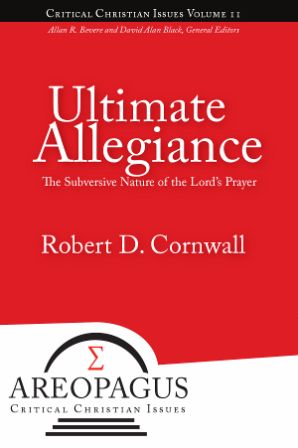
I have
long felt that our usual method of reading the Disciples' Prayer needed
a corrective; and this book is it. The authors of our little series
represent a larger tension in the academic world: Luther versus Erasmus,
revolution versus reform, a brave new approach versus the patching up of
an old garment. Cornwall's book will delight and surprise you, I think.
When I first read it I thought back to a Denkmal in Worms, Germany, and
its famous plaque: "Hier stehe Ich, Ich kann nicht anders." I hope many
small group Bible studies will find the book interesting and profitable.
10:41
AM
On
dispensing with "Q":
One problem that arises is that of
the existence of Q. We cannot confront this issue here, for the
complexity of such a task would be significant enough to warrant a
book of its own. However, as we have seen, the Fourfold-Gospel
Hypothesis permits us to dispose with Q as a gospels source; and,
indeed, all such hypothecated documents (including M and L) become
unnecessary when we bear in mind the statement of Clement of
Alexandria that those Gospels containing genealogies came first.
From
Why Four Gospels?
9:50
AM
It seems
odd to be sitting here at home while B has gone off to church at Bethel
Hill. But I'm feeling washed out and my stomach has been upset for 2
days now. Nothing major, but I don't have my normal strength and there's
no sense in pushing myself when I'm having my tumor removed tomorrow. At
this moment I have no ambition to do anything but write. But two things
first:
1) I am
oceans away from Ethiopia but I feel very much the agony of our friends
there who are suffering from malaria. These now include Tilahun,
Aberesh, and Baby Nathan -- yes, our Baby Nathan.
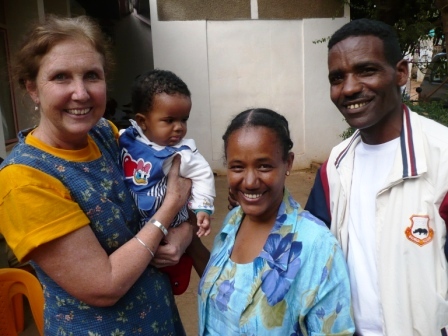
I'm not
exactly sure how they're doing. I've only received a second-hand report.
But in Alaba, malaria is serious business. It's often fatal. I'm not
saying this to be dramatic. It's just reality. And I know what
they must be feeling. First of all there's the incredible pain. Then the
awful chills and fever. And finally the uncertainty. I'm especially
concerned for Aberesh who's already lost who knows how many babies.
Living in Alaba is like being in a war zone. It becomes natural to
expect death. It is an everyday happening. You simply cannot envisage a
time when there would not be malaria or typhoid of typhus any more. How
can anyone go on in the face of all that?
It's not
the first time I've prayed for Aberesh and it won't be the last. This is
where faith comes in. Faith in a God who is always loving and always in
control. Faith that allows me to imagine a world being redeemed by a
Savior who know what it's like to suffer. Faith that hopes and never
gives up. I know I'm being selfish, but right now I'm praying for Baby
Nathan to be completely healed from his malaria. I want to see him grow
old and hobble on his cane like other shemagalis and sit on his stool
and tell stories to his grandchildren. Maybe even stories of those two
white-faced foreigners who used to visit Alaba many years ago.
I'm
ready to storm heaven on behalf of that boy and his parents.
2) Our
Student Day was wonderful. Lots of good fellowship and, most
importantly, plenty of good conversation focused on things of eternal
value. In case you're interested I post here a few photos.
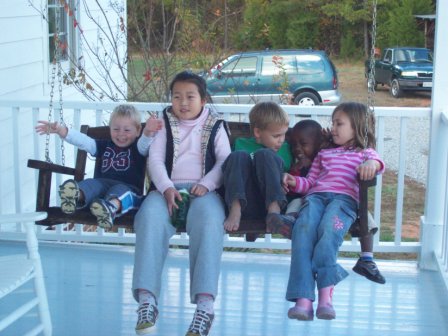
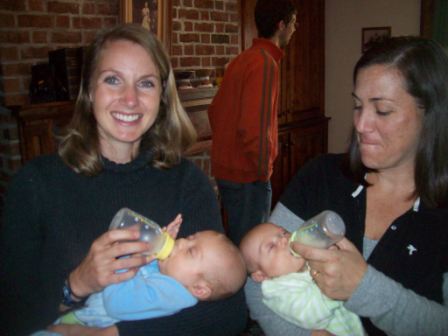

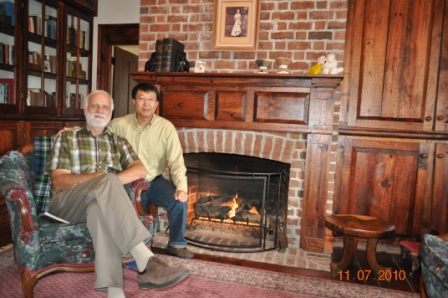
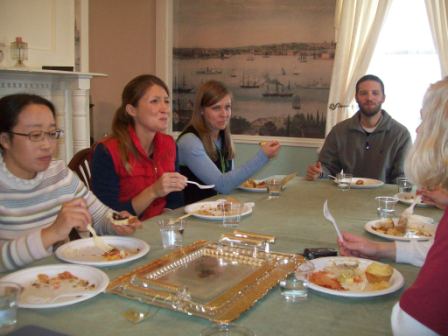
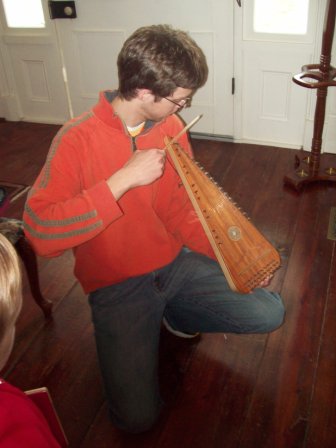
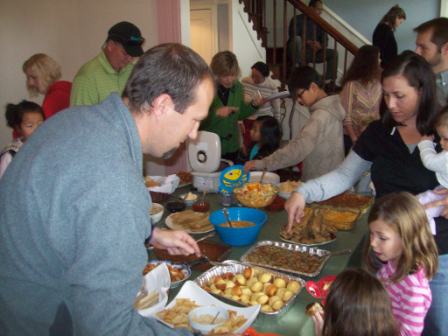
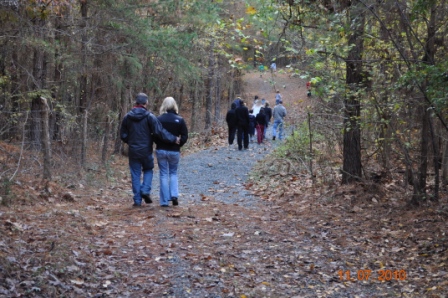


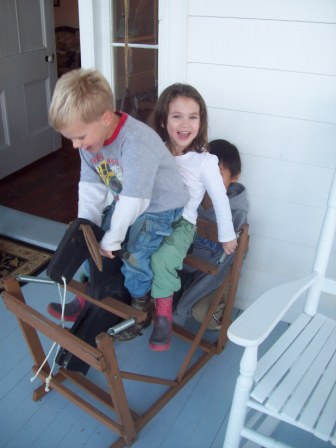
Saturday,
November 6
8:22
AM
I'm
eager to get to know my students a bit better today. I especially want
to know if they think their seminary education is worth the effort. I
enjoyed Talbot but found it dull. I had some good teachers, but most of
them employed the "You sit still while I instill" method of teaching.
I can get this in one fourth the time by reading the textbook I
thought to myself. The one thing I really missed was independent
thinking. I don't know whether it was stupidity or inability on my part
but I was always eager to learn new ideas. I had one professor I
especially enjoyed. He was highly emotional, remarkably unfair in his
grading policy, very temperamental -- and we all were devoted to him. He
had been a missionary to China before being booted out by the Reds. It
seems to me that good teaching always awakens some response in the
students. Mere information is useless -- less than useless. It gives you
nothing more than you had before. I recall thinking to myself, You
may one day be a teacher yourself. Will you be a good one? I think a
wild hope was springing up in me. It was indeed a happy time.
My
former missionary professor impacted me profoundly. In fact, I almost
decided to do my doctorate under Peter Beyerhaus at Tübingen.
We hit it off quite well. I was thinking about writing a dissertation on
the history of Christian missions in the Hawaiian Archipelago. We
thought this was a fitting topic for someone who was hatched and reared
on Oahu. Of course, the Lord eventually sent me to Basel to study New
Testament. I remember my stay there always as being one of the happiest
experiences I have ever known.
So what are my
students thinking? Are they being challenged to think biblically? Are
they enjoying their studies? Or are they bemoaning the effort?
Friday,
November 5
1:05
PM
The
University of Maryland announces an opening in
Biblical Studies.
12:51
PM
So how
do you like our new red roof?

12:42
PM
It hit
me today, while praying for Ethiopia. What footprint will Becky and I
leave there? We've been working and planning and organizing the ministry
there for many years now. So what's next?
Here's
one thing. This Sunday Becky and I are sending a woman from Koro village
in Burjiland to the hospital in Soddu. Her name is Ayelech. Ayelech
first came to see Becky in November of 2008 complaining of a lump in her
left breast. At times she would bleed from her nipple. Once her 4-year
old son accidentally hit her in that breast and she fainted, so strong
was the pain. Becky gave her some funds to travel to Soddu hospital way
back then. Her lump needed a biopsy. Ayelech tried to go to Soddu
several times but each time the Gujis began fighting the Burjis. In a
word, Ayelech was afraid to travel. You'd be too if all your life you
feared the warlike Gujis who seem to delight in taking the lives of
Burjis. All of this would have been insignificant if her lump had gone
away but, of course, it hasn't. It's incredible -- the faith these
simple Burji villagers have. Ayelech figured that if God closes a door
He always opens a window. The window, in her mind, was a miraculous
healing. Well, this has not occurred. So it's time to try again to send
her to Soddu. Ethiopia is such an odd kaleidoscope of cultures and
peoples. You never know what will happen and when. The Guji warfare
could flare up again at any moment. So I feel a sense of urgency in
getting Ayelech on her way. Bec and I will sponsor her and her husband
and one other man to make the trip. They will be driven there in our
clinic vehicle.
In the
middle of all of this I am struck by something I feel I should really
thank God for. I praise Him that there is a good Christian hospital in
Soddu. I thank Him that our clinic has an ambulance. I praise Him that
He is deeply concerned, not only with the grand scheme of salvation, but
with the most intimate details of our lives and work and health and
families. Somewhere in the middle of all of this God is saying to me:
I've got both you and Ayelech in my hands. All I have to do is stop
worrying and trust Him.
I can't
even being to tell you how much I love Ayelech. I'll be praying night
and day for her until I find out the results of her biopsy. Funny,
I think to myself, what if we both have our biopsy on the same day?
It would be just like God to do that. Becky thinks she'll probably need
a radical mastectomy. God knows.
Meanwhile, I try to resign myself to the reality that I'll never be able
to explain adequately what the people of Ethiopia mean to me.
I leave
you with a couple of pix of Koro village in the highlands of Burji.
Peace,
Dave
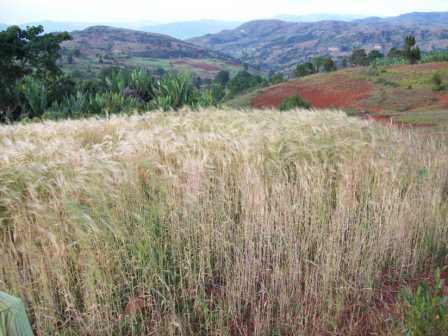
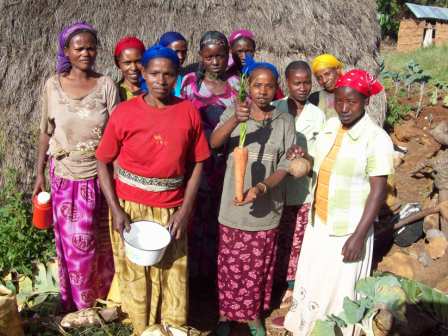
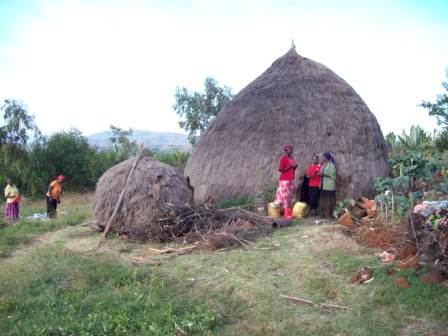
9:40
AM
Out of curiosity I decided I'd hop over to the new NIV
and see what it did with John 21:5. I was surprised to see the
following:
He called out to them, "Friends, haven't you any
fish?"
Oddly,
there is no footnote indicating that the Greek has "children" instead of
the NIV's "friends."
Odd
indeed. Of course, Greek words have several different meanings, and
between two languages the sets of meaning never completely correspond.
But in no case does the range of meaning of Greek paidia seem to
encompass the idea of "friends" (which in Greek would, of course, be
philoi).
So what
is going on here? Perhaps the translators want to avoid making Jesus use
pejorative or insulting language. We do this in English when we
substitute "government" for "regime" (the latter being pejorative). Or
perhaps the issue is one of language etiquette. At the bottom of our
language etiquette scale in English we find sequences like the
following, spoken in an unmistakably contemptuous tone:
Hey there, kid (boy, punk) – what do
you think you're doing?
And so
the issue of appropriateness is raised. But could Jesus have meant to
use language that was, say, a little edgy? On the one hand, He hardly
ever uses "children" to address His disciples. And on the other, it
seems clear that He wanted to get their attention – and apparently He
succeeded. Or is "children" a term of endearment (as suggested by BDAG)?
In the end we may never know why Jesus chose paidia over
philoi. Don Carson suggests (in his John commentary) that paidia
may mean nothing more than "lads" (following British usage). He
translates the expression, “Lads, haven’t you caught anything?” In the
ISV we have "Children, you don't have any fish do you?" – an attempt to
bring out the force of the Greek adverb me, which implies a
negative answer. Either way, I hardly see how one can avoid the
pejoration (or sarcasm, or attention-getting language, or endearing
term) that Jesus intended here. A simple note in the NIV (Lit.
children) would have sufficed. But as it stands now, the NIV (old
and new editions) is clearly wrong.
What do
you think about the new NIV? You can read it
here.
9:34
AM
Job openings:
9:24
AM
I enjoyed reading Arthur Sido's essay called
Serving by observing? The question
he raises is a crucial one: How can members of our churches best serve
the Lord and others on Sunday morning? He writes:
Paul describes the church gathering in 1 Corinthians
14 as a meeting where all the brothers are participating, where each
has something tangible to bring, where we edify one another and not
through the "one and all the others" tradition. The participatory
model from Scripture is not how the church typically meets now and
it hasn't done so for over 1000 years except in rare divergences,
divergences that often were met with persecution.
Surely this is healthier than sitting and soaking.
Arthur's essay takes seriously the lay perspective (actually, he does
not hold to a clergy-laity division) and the need for all believers to
be actively involved in the arenas of church life, including during the
so-called "worship service." This is a bold theological move and one I
certainly applaud. In my own church I sense there is a great deal of
freedom for the Spirit to direct non-professionals to participate in the
assembly. I am not saying that we shouldn't sit still and pay careful
attention to the one who is teaching.
But Paul is
very clear in 1 Corinthians 14: every believer has a ministry, and
everyone is to participate and give to others what God has given him or
her. The same principle is stated in Hebrews 10:24-25: "And let us
consider one another to provoke unto love and good works, not forsaking
the assembling of ourselves together, as the manner of some is, but
exhorting one another, and so much the more, as you see the day
approaching." Here the purpose of gathering together as the body of
Christ is made crystal clear: mutual ministry. The emphasis is
not on where we so often put it ("go to church!") but rather on the
truth that each of us should minister to the others when we come
together as a group. I welcome the insightful work that Arthur is doing
in challenging the current paradigm of church life. So remember: Your
gift may seem small, but as part of the manifold grace of God is has
tremendous value to the Body.
One more
thing: If the sermon is not to be central, what or who is?
9:12
AM
Speaking of writing, I've been looking for a good
commentary on Matthew to use in my Greek exegesis classes. I'm afraid I
have to disagree with
one writer's glowing assessment of
Grant Osborne's new Matthew commentary in the Zondervan series. An
example is Matt. 5:22, where no mention is made whosoever of a textual
variant that affects both translation and interpretation in a major way.
Is Jesus forbidding all anger or only anger "without a cause"? You'd
never know there was a problem unless you went elsewhere. Osborne's
commentary is thinner here (and elsewhere) than I thought it would be.
Pastors need to know just what Jesus is teaching here about anger. The
disputed adverb eike makes all the difference in the world for
one's interpretation – and application – of the text. So why no
discussion? In his preface Grant writes that "…one goal in this
commentary series is to summarize briefly the current state of
scholarship on key issues; thus on debated passages, I usually list
scholars on the various sides of the point." He adds, "…I summarize the
sides as simply and practically as possible so that the pastor can
decide which of the possibilities to choose on the issue." In one of my
Novum Testamentum articles I discussed the variant in Matt. 5:22
in great detail but nothing is made of it here. I would at least like to
have seen the variant mentioned. I must also note my disappointment with
Grant’s treatment of the synoptic problem, which merits only a brief
response even though one's "solution" to it colors one's entire
perspective. For example, Grant writes, "If Matthew were first, it is
hard to conceive of Mark omitting so much material from Jesus,
especially discourses like the Sermon on the Mount or the Church
Discourse of ch. 18 or the parables in the Olivet Discourse (ch. 13)."
As if Farmer's Two-Gospel Hypothesis or my own Fourfold-Gospel
Hypothesis had nothing to say in reply to this argument! Grant, of
course, repeats an argument that has been made since the time of B. F.
Streeter (The Four Gospels, p. 158): "Only a lunatic would leave
out Matthew's account of the Infancy, the Sermon on the Mount, and
practically all the parables, in order to get room for purely verbal
expansion of what was retained." The fatal flaw with this argument, in
fact, "is precisely the baseless assumption that Mark (or Peter)
intended to write a Gospel like the other two" (Why Four Gospels?
p. 36). Our side of the argument has not been presented. If you are
going to state "There are stronger arguments for Markan priority," then
I should think you had better give at least a few of the "strong"
arguments for the other side. I am no Gospels scholar, but I would like
to see the perspective of non-Markan priorists given a fair shake. On
further rumination, perhaps I should not be surprised at any of this.
The academic guild has long since acquiesced to Markan priority. But if
I am going to require that my students read a major exegetical
commentary based on the Greek text, it will have to be one that deals
with the foremost controversies in a balanced sort of way.
8:55
AM
I am re-reading Yoder's fantastic
The Politics of Jesus. What a
marvelous book. He is a great writer and a great theologian. Much better
stuff than the moth-eaten labors of pseudo-scholars. I want to learn to
write like that. His theology raises my spirits. Such a book, if
students would only read it, has the potential of getting the church to
rethink her fallen ways. In the meantime I am reviewing works that
authors or publishers have sent me for my appraisal. One of them,
dealing with the missionary theology of John Piper, is quite well done.
The rest are same-old same-old books about hermeneutics or New Testament
introduction or biblical Greek, etc. I have to laugh at myself for just
writing that sentence. I've written a few books like that myself!
So I shed a tear, and move on to other works.
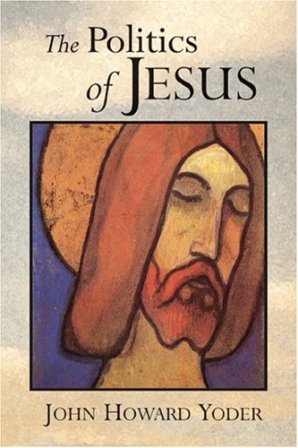
8:43
AM
Tomorrow
is STUDENT DAY at Rosewood Farm! Looking forward to welcoming my
students to my home-sweet-home. If you haven't signed up it's not too
late. A simple email will do. If you need directions, let us know. Or
you can Google Map it at 2691 White House Road, Nelson, VA 24580. See
you soon!
8:40
AM
As Monday's surgery approaches, my inner feelings clamor
for concealment, but here they are. I am confronting a problem many
thousands of people face every year in America. It is wrong and unjust
for me to feel that God is picking on me. The Christian life is not
premised on the assumption that we can avoid the physically onerous.
Believers in Jesus have choices forced on them just as anyone else does.
My attitude is my choice. Oh how I pray that I will be cheerful (as I
ought to be) and winsome (as I want to be) wherever I go and with
whomever I speak! Thankfully, for me the question is How should I
pray to God? rather than Does God exist? I feel that C. S.
Lewis got to the latter place in his life. I sense that he was near
despair, that he desired nothing more than to lie down among the dying
leaves of fall and let himself rot into the earth. I want to be
especially careful how I talk about this to others. Vicious relativism
is not an option. I must take courage from the apostle Paul's example
and clearly say that the problem with our society is its sinful
presumption that man is born to be happy, when all of us clearly have to
die sometime. In my teaching I call students to exhibit confidence in
the Lordship of Christ as the truth of our existence. What the Bible
reveals to us is not a morality but a reality – a living
Person to whom we respond and with whom we walk each and every day of
our lives. No Bible verse, no matter how true, can substitute for the
life-giving power of that Person. Without Him – and even with Him
at times – life is haunted with mystery and frightened by understanding.
Never to my dying day will I forget that moment when I was 8 years old
that I met this wonderful Savior, when I "accepted" Jesus, though I will
probably always regret that I did not learn sooner that He threatens
society by creating a new kind of community that leads to a radically
new kind of life. This Jesus comes to me in my weakness, is all
tenderness and understanding and encouragement. I am released from my
fears and doubts, and then He sends me right back into the fray of life
to be subject again to the temptations of envy, anger, sloth, avarice,
gluttony, self-pity, lust – in short, the temptation to refuse to
"accept" Jesus again and again as my Savior from sin and Lord of my
life.
Dear
Jesus, in accepting my weakness and infirmities, I am accepting you. I
am struck by the improbability, indeed the seeming impossibility, of
ever serving you with all of my heart. The prophet's precept reminds me
that it is not by might nor by power but by your Spirit that I overcome.
So thank you for saving me despite my sin and for using me despite my
weakness. May everything that transpires next week and in all of my
weeks bring you joy and glory. Amen.
8:23
AM
At the Shepherds Seminary last night I spoke on the
origins of the four Gospels. And what a great time we had.
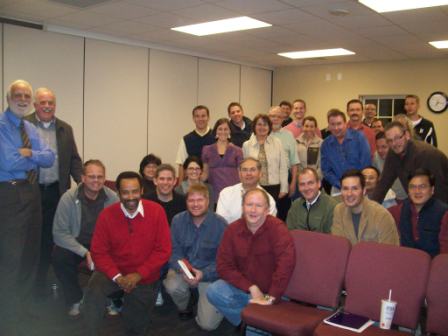
Believe
it or not, I am always uncomfortable in crowds. I am not and never will
be a good conversationalist. I have to be alone before I can really
think. I can write it better than I can say it. On the other hand,
people are so kind to me that I feel so undeserving of the honor of
being a public speaker. Surely they can find someone else to talk to
them? However, everywhere I go I find students who are willing to
rethink the issues, and I could jump to high heaven as a result. Someone
once quipped, "If you can't drive a train you can always be a
wheel-greaser." So off I went to the STS, grease gun in hand.
I was
thrilled to meet in Doug Bookman a professor who is open to
reconsidering the synoptic problem. I am meeting more and more scholars
like him in evangelical circles.
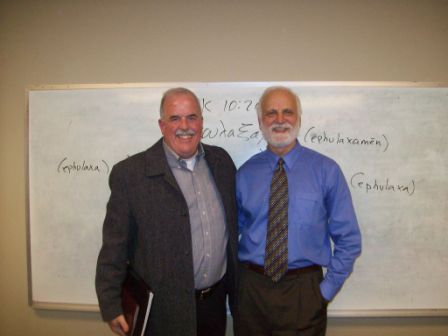
I think
the consensus starting breaking down years ago. I well recall an event
that made publishing history in 1987. Mann's Anchor Bible commentary on
Mark was revolutionary in that a major publisher allowed the appearance
of a work that argued that the author of Mark made use of the earlier
Gospels of Matthew and Luke. Of course, Mann was accused of turning the
clock back. For indeed, there is nothing new at all in his solution to
synoptic relationships. Matthean priority was the leading view among
university trained scholars until the nineteenth century. Even today
this view has its supporters. William Farmer dispensed with "Q" and
advocated a Two Gospel Hypothesis, as did David Peabody, George Wesley
Buchanan, David Dungan, and Lamar Cope. Others dispense with "Q" but
still hold to Markan priority. As everyone knows, paradigm shifts often
come dramatically. They require a patient reexamination of the raw data
over a considerable course of time. I hold no illusions that my lecture
will change anyone's mind. I hope the debate and discussion will
continue and that students of the Gospels will feel free to rearrange
some of the best of their theological presuppositions. It turns out, in
fact, that there are perfectly sound scientific reasons for Mark's
procedure in following the Matthean and Lukan accounts. Clearly it is
time for advocates of Markan priority to give renewed consideration to
the testimony of the earliest church fathers. "Q" is certainly wobbling,
at least among students. Then there is the argument based on Mark's
"course style" – which I responded to years ago in an essay in
Filologia Neotestamentaria. That is, if we picture Mark as recording
the words of Peter verbatim and viva voce, there will no problem in
seeing the diction of Mark’s Gospel as less refined or literary than
that of Matthew and Luke. So the internal evidence needs to be examined
rigorously. But not, in my view, at the expense of the external
evidence.
So
I hope my little talk last night will enrich and
encourage the ongoing debate. To everyone who came out to hear this
obscurantist, a heartfelt "thank you."
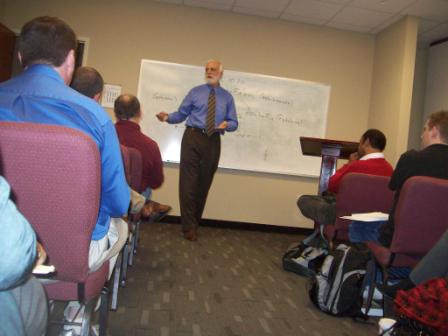
8:12
AM
Good
morning bloggers. I've got some great news to report. Becky's CT scan
showed NO additional growth in her tumors. This means we will continue
the Adriamycin treatments. This is a special blessing from our great God
and a real answer to prayer. So, next Monday, while I'm having my
surgery, Becky will be next door having her chemo. Another hot date!
Monday,
November 1
8:17
PM
Highlight of the day: Becky and I drinking our Coke-flavored contrast
together before our CT scans. How's that for a hot date?
6:04
PM
This is my favorite time of the day. Dusk, and the farm is at peace. The
day draws to a close. The contrails fan out high above us, and beyond
them is the abode of my God. He orchestrated this day wonderfully. B had
her CT-scan, and I was able to get all of my pre-ops done -- in one day
no less (meeting with the surgeon, EKG, blood work, chest X-Ray,
CT-scan). Surgery is scheduled for next Monday at UNC, followed by a
biopsy. Words are inadequate to describe the peace I feel despite my
tiredness. There is no such thing as chance with God.
Everything God permits is guaranteed by His nature.
I hasten to add that I felt your prayers, and I'm most grateful.
We should have the results of Bec's scan Wednesday or possibly Thursday.
I am eager to hear the report. I'll keep you posted.
Peace,
Dave
October 2010 Blog Archives
September 2010 Blog Archives
August 2010 Blog Archives
July 2010 Blog Archives
June 2010 Blog Archives
May 2010 Blog Archives
April 2010 Blog Archives
March 2010 Blog Archives
February 2010 Blog Archives
January 2010 Blog Archives
December 2009 Blog Archives
November 2009 Blog Archives
October 2009 Blog Archives
September 2009 Blog Archives
August 2009 Blog Archives
July 2009 Blog Archives
June 2009 Blog Archives
May 2009 Blog Archives
April 2009 Blog Archives
March 2009 Blog Archives
February 2009 Blog
Archives
January 2009 Blog Archives
November 2008 Blog
Archives
October 2008 Blog Archives
September 2008 Blog
Archives
August 2008 Blog Archives
July 2008 Blog Archives
June 2008 Blog Archives
May 2008 Blog Archives
April 2008 Blog Archives
March 2008 Blog Archives
February 2008 Blog
Archives
January 2008 Blog Archives
December 2007 Blog
Archives
November 2007 Blog
Archives
October 2007 Blog Archives
September 2007 Blog
Archives
August 2007 Blog Archives
June-July 2007 Blog
Archives
May 2007 Blog Archives
April 2007 Blog Archives
March 2007 Blog Archives
February 2007 Blog
Archives
January 2007 Blog Archives
Nov-Dec 2006 Blog Archives
October 2006 Blog Archives
September 2006 Blog
Archives
August 2006 Blog Archives
July 2006 Blog Archives
June 2006 Blog Archives
May 2006 Blog Archives
April 2006 Blog Archives
March 2006 Blog Archives
February 2006 Blog
Archives
January 2006 Blog Archives
Nov-Dec 2005 Blog Archives
October 2005 Blog Archives
September 2005 Blog
Archives
August 2005 Blog Archives
May 2005 Blog Archives
April 2005 Blog Archives
March 2005 Blog Archives
February 2005 Blog
Archives
January 2005 Blog Archives
December 2004 Blog Archives
November 2004 Blog Archives
October 2004 Blog Archives
September 2004 Blog Archives
August 2004 Blog Archives
July 2004 Blog Archives
June 2004 Blog Archives
May 2004 Blog Archives
April 2004 Blog Archives
March 2004 Blog Archives
February 2004 Blog Archives
January 2004 Blog Archives
December 2003 Blog Archives
November 2003 Blog Archives
| 


































